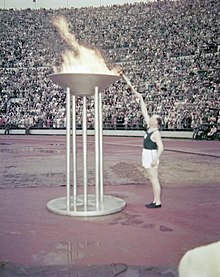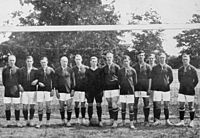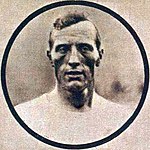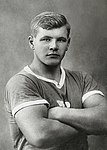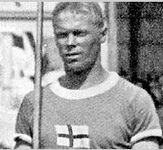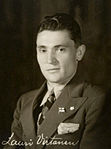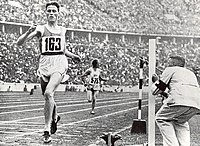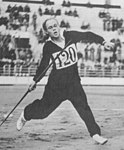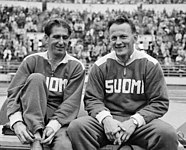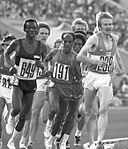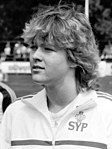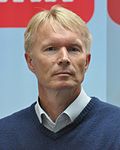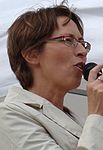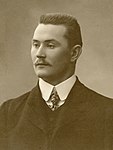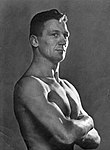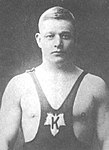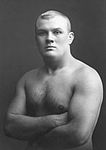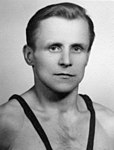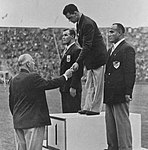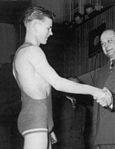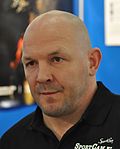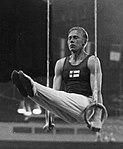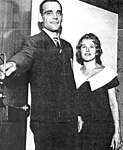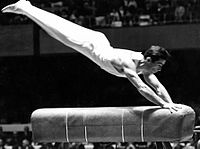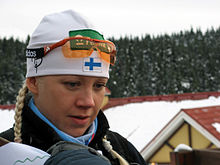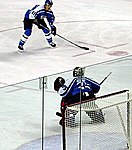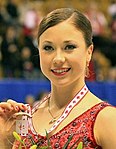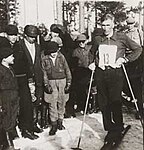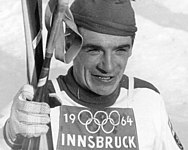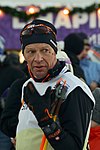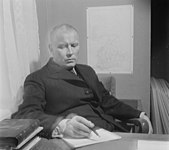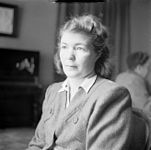Olympic history of Finland
The Olympic history of Finland began in 1906 with the private participation of four Finnish athletes in the unofficial Olympic Intermediate Games in Athens in 1906 . In 1907 the Finn Baron Reinhold Felix von Willebrand was elected to the International Olympic Committee (IOC), shortly afterwards Finland founded its National Olympic Committee Suomen Olympiakomitea and officially took part in the 1908 Summer Olympics in London for the first time. Until the Games in the 1912 Summer Games , Finland was still part of the Russian Empire as an autonomous grand duchy ; however, the results were separated from those of Russia. Finland did not take part as an independent country until 1920 and has since been present at all Summer Olympics and the Winter Games that took place from 1924 onwards. Young athletes have competed in all of the Youth Olympic Games that have been held so far.
General
Finland is one of the nations that has won at least one medal in all of its participation. Finland is a world leader in cross-country skiing. With 76 medals won, the country is second behind Norway in the Olympic rankings for this sport. Cross-country skiing is the most successful winter sport in Finland and the third most successful sport ever. Finland does even better in athletics with 114 medals and in wrestling with 83 medals. In wrestling, Finland ranks 4th behind the USA, the Soviet Union and Sweden. Finland ranks equally in athletics behind the USA, the United Kingdom and the Soviet Union.
The first Finnish Olympic team started in 1908 and consisted of 68 participants. The members of the shooting team with the free rifle in three-position combat, Emil Nässling, Frans Nässling, Gustaf Nyman, Heikki Huttunen, Voitto Kolho and Huvi Tuiskanen, were the first Finnish Olympians on July 9, 1908. On July 8, 1912, the swimmers Tyyne Järvi and Regina Kari became the first Finnish women to take part in the Olympic Games. The first winter athletes were figure skaters who took part in the 1920 Summer Olympics. Sakari Ilmanen entered on April 25, 1920. The next day , the first winter athlete was Ludowika Jakobsson , who won the pair skating with her husband Walter Jakobsson and was the first Finnish woman to win a medal or to become an Olympic champion. Her husband Walter was the first male winter sportsman to win a medal and become an Olympic champion at the same time.
The first men's medal was won by the all-around gymnastics team on July 16, 1908. On July 22, wrestler Verner Weckman became the first Finnish Olympic champion with his victory in the Greco-Roman light heavyweight division. The first woman to win a medal at summer games was javelin thrower Kaisa Parviainen on July 31, 1948 , who won silver. The first Olympic champion at the Summer Games was the canoeist Sylvie Saimo on July 28, 1952 , who won the kayak single.
The most successful Olympian is the long-distance runner Paavo Nurmi , who won a total of nine gold and three silver medals between 1920 and 1928. He is still the most successful athlete at the Olympic Games and is ranked 8th among the most successful athletes ever. The most successful winter sportsman is the speed skater Clas Thunberg with five gold, one silver and one bronze medal between 1924 and 1928 . The most successful woman is the cross-country skier Marja-Liisa Kirvesniemi . Between 1976 and 1994 she won three gold and four bronze medals.
The ski jumper Janne Ahonen played most of the Olympic Games . It started seven times between 1994 and 2018. Another ski jumper from Finland holds the record as the youngest Olympic champion at the Winter Games. Toni Nieminen set this record in 1992 when he won gold on the large hill at the age of 16 years and 259 days.
Most of the Finnish athletes started at the 1952 domestic summer games. 258 Finns took part in Helsinki. Most of the winter athletes were there in 2018, the team comprised 100 athletes.
With 37 medals, Finnish athletes won the most medals in Paris in 1924. Four years earlier in Antwerp they won three fewer medals, but achieved one Olympic victory (15) more than in Paris (14). Finnish winter sports enthusiasts won 13 medals in Sarajevo in 1984. With four gold medals, they achieved as many Olympic victories as in 1924, 1988 and 2002.
Finland has an IOC member with voting rights in the former track and field athlete Sari Essayah . Essayah participated while walking in 1992 and 1996. In 1992, she took fourth place over 10 kilometers.
Applications and hosting of the Olympic Games
Applications
Summer games
So far Finland has applied twice to host the Summer Olympics. As early as 1928, the first plans were made to bring the Olympic Games to Finland, which is why a foundation was established to build the Helsinki Olympic Stadium . The first application was at the 1932 IOC session in Los Angeles for the 1940 Summer Olympics . While waiting for the IOC's decision, construction began on February 12, 1934, on the stadium, which had been designed by Yrjö Lindegen and Toivo Jäntti . At the IOC session in Berlin in 1936 , 26 of the members present decided for Finland, 21 for Japan. Absent members had previously voted by postal vote , which resulted in an election result of 36 to 27 for Japan, whereupon the IOC awarded the Games to Tokyo . Nevertheless, construction work on the stadium continued and was almost completed by the summer of 1938. When Japan failed to host the Second Sino-Japanese War , Finland accepted the offer in June 1938 as runner-up to play the games after all. The official inauguration of the Olympic Stadium took place on June 12, 1938; the eastern wall and missing rows of seats were completed during the year. In autumn 1939 the Second World War broke out and, as a result, the Winter War . The construction work on the swimming stadium was interrupted, but the Olympic village in Koskelantie with accommodation for 3,200 athletes was completed by 1940. On April 23, 1940, Finland also decided not to host the event because of the war. The 1940 Summer Games were completely canceled.
After the end of the war, Finland decided on April 23, 1947, under the leadership of Erik von Frenckell , the President of the Organizing Committee, to apply again. In the vote in Stockholm on June 17, 1947 , Helsinki received the majority of the votes and thus the IOC won the bid to host the 1952 Summer Olympics . Building on the preparatory work in the previous application, the Organizing Committee developed its plans for the 1952 Summer Games. Most of the events were to take place around the Olympic Stadium, only the pentathlon and some football games were relocated to cities outside Helsinki ( Hämeenlinna , Turku , Tampere , Kotka and Lahti ). The Olympic Stadium itself was slightly expanded and received 20,000 more seats on wooden stands, which increased its capacity to 70,000. In addition, changing rooms, showers etc. had to be set up for the athletes, for whom competitions were now also offered, and some of the venues had to be modernized. The interrupted construction work on the swimming stadium continued in 1947. A stadium was built in Taivallahti for the rowing competitions in 1940, but in 1952 it no longer complied with the regulations. That is why a temporary stadium was built in Meilahti. The Olympic village, built in 1940, had meanwhile been released for private use and was inhabited by 500 families, which is why a new one was built in Käpylä. Originally designed for 3,400 residents, the plans were revised again due to the high number of participants at the 1948 Summer Olympics in London . The complex ultimately offered space for 4,800 people.
Winter games
Finland put together five applications to host the Winter Games. Lahti applied for the events in 1964 , but failed without a vote. When applying to host the 968 Winter Games , they were eliminated in the second ballot; when applying for the 1972 Winter Games , they were eliminated with seven votes in the first ballot. Tampere applied to host the 1976 Winter Game . Tampere was eliminated with eight votes in the second ballot. Helsinki's application to host the 2006 Winter Games was not accepted by the IOC.
Alignment
The 15th Olympic Games took place in Helsinki from July 19 to August 3, 1952. A total of 4955 athletes (4436 men, 519 women) from 69 countries, including the Soviet Union for the first time , took part in 149 competitions in 17 sports. The Olympic flame was lit by Paavo Nurmi, the Olympic oath was taken by gymnast Heikki Savolainen .
Overview of the participations
Summer games
| year | Athletes | Flag bearer | Medals | ||||||
|---|---|---|---|---|---|---|---|---|---|
| total | m | w |
|
|
|
total | rank | ||
| 1896-1904 | not participated | ||||||||
| 1908 | 62 | 62 | 0 | Bruno Zilliacus | 1 | 1 | 3 | 5 | 13 |
| 1912 | 164 | 162 | 2 | One Saastamoines | 9 | 8th | 9 | 26th | 4th |
| 1920 | 63 | 62 | 1 | Emil Hagelberg | 15th | 10 | 9 | 34 | 4th |
| 1924 | 120 | 120 | 0 | Elmer Niklander | 14th | 13 | 10 | 37 | 2 |
| 1928 | 69 | 67 | 2 | Akilles Jarvinen | 8th | 8th | 9 | 25th | 3 |
| 1932 | 40 | 40 | 0 | Akilles Jarvinen | 5 | 8th | 12 | 25th | 7th |
| 1936 | 107 | 102 | 5 | Akilles Jarvinen | 7th | 6th | 6th | 19th | 5 |
| 1948 | 122 | 117 | 5 | Hannes Sonck | 8th | 7th | 5 | 20th | 6th |
| 1952 | 258 | 228 | 30th | Väinö Suvivuo | 6th | 3 | 13 | 22nd | 8th |
| 1956 | 71 | 70 | 1 |
Eeles Landström (Melbourne) Erkki Estola (Stockholm) |
3 | 1 | 11 | 15th | 13 |
| 1960 | 117 | 107 | 10 | Eeles Landström | 1 | 1 | 3 | 5 | 17th |
| 1964 | 89 | 84 | 5 | Eugen Ekman | 3 | 2 | 5 | 12 | |
| 1968 | 66 | 60 | 6th | Pentti Linnosvuo | 1 | 2 | 1 | 4th | 24 |
| 1972 | 96 | 89 | 7th | Ilkka Nummisto | 3 | 1 | 4th | 8th | 14th |
| 1976 | 83 | 77 | 6th | Let Virén | 4th | 2 | 6th | 11 | |
| 1980 | 105 | 99 | 6th | Peter Tallberg | 3 | 1 | 4th | 8th | 12 |
| 1984 | 86 | 73 | 13 | Esko Rechardt | 4th | 2 | 6th | 12 | 15th |
| 1988 | 78 | 59 | 19th | Jouko Salomäki | 1 | 1 | 2 | 4th | 25th |
| 1992 | 88 | 60 | 28 | Harri Koskela | 1 | 2 | 2 | 5 | 29 |
| 1996 | 76 | 47 | 29 | Mikko Kolehmainen | 1 | 2 | 1 | 4th | 40 |
| 2000 | 70 | 40 | 30th | Heli Rantanen | 2 | 1 | 1 | 4th | 31 |
| 2004 | 53 | 36 | 17th | Thomas Johanson | 2 | 2 | 62 | ||
| 2008 | 57 | 31 | 26th | Juha Hirvi | 1 | 1 | 2 | 4th | 44 |
| 2012 | 56 | 29 | 27 | Hanna-Maria Seppälä | 2 | 1 | 3 | 60 | |
| 2016 | 54 | 26th | 28 | Tuuli Petäja | 1 | 1 | 78 | ||
Winter games
| year | Athletes | Flag bearer | Medals | ||||||
|---|---|---|---|---|---|---|---|---|---|
| total | m | w |
|
|
|
total | rank | ||
| 1924 | 17th | 16 | 1 | 4th | 4th | 3 | 11 | 2 | |
| 1928 | 18th | 17th | 1 | Esko Järvinen | 2 | 1 | 1 | 4th | 4th |
| 1932 | 7th | 7th | 0 | Ossi Blomqvist | 1 | 1 | 1 | 3 | 5 |
| 1936 | 19th | 19th | 0 | Sulo Nurmela | 1 | 2 | 3 | 6th | 4th |
| 1948 | 24 | 24 | 0 | Pekka vannins | 1 | 3 | 2 | 6th | 8th |
| 1952 | 50 | 45 | 5 | Heikki Hasu | 3 | 4th | 2 | 9 | 3 |
| 1956 | 31 | 27 | 4th | Antti Hyvärinen | 3 | 3 | 1 | 7th | 3 |
| 1960 | 48 | 42 | 6th | Paavo Korhonen | 2 | 3 | 3 | 8th | 6th |
| 1964 | 51 | 45 | 6th | Veikko Hakulinen | 3 | 4th | 3 | 10 | 4th |
| 1968 | 52 | 44 | 8th | Veikko Kankkonen | 1 | 2 | 2 | 5 | 10 |
| 1972 | 50 | 43 | 7th | Juha Mieto | 4th | 1 | 5 | 15th | |
| 1976 | 47 | 38 | 9 | Rauno Miettinen | 2 | 4th | 1 | 7th | 6th |
| 1980 | 52 | 44 | 8th | Heikki Ikola | 1 | 5 | 3 | 9 | 7th |
| 1984 | 45 | 40 | 5 | Jorma Valtonen | 4th | 3 | 6th | 13 | 4th |
| 1988 | 53 | 46 | 7th | Pertti Niittylä | 4th | 1 | 2 | 7th | 4th |
| 1992 | 62 | 49 | 13 | Timo Blomqvist | 3 | 1 | 3 | 7th | 8th |
| 1994 | 61 | 47 | 14th | Marja-Liisa Kirvesniemi | 1 | 5 | 6th | 16 | |
| 1998 | 85 | 51 | 34 | Janne Ahonen | 2 | 4th | 6th | 12 | 11 |
| 2002 | 98 | 62 | 36 | Toni Nieminen | 4th | 2 | 1 | 7th | 8th |
| 2006 | 90 | 59 | 31 | Janne Lahtela | 6th | 3 | 9 | 19th | |
| 2010 | 91 | 58 | 33 | Ville Peltonen | 1 | 4th | 5 | 24 | |
| 2014 | 99 | 66 | 33 | Enni Raukajärvi | 1 | 3 | 1 | 5 | 18th |
| 2018 | 100 | 61 | 39 | Janne Ahonen | 1 | 1 | 4th | 6th | 18th |
Interludes
| year | Athletes | Flag bearer | Medals | ||||||
|---|---|---|---|---|---|---|---|---|---|
| total | m | w |
|
|
|
total | rank | ||
| 1906 | 4th | 4th | 0 | 2 | 1 | 1 | 4th | 13 | |
Youth Summer Games
| year | Athletes | Flag bearer | Medals | ||||||
|---|---|---|---|---|---|---|---|---|---|
| total | m | w |
|
|
|
total | rank | ||
| 2010 | 19th | 11 | 8th | Niki Blassar | 2 | 2 | 83 | ||
| 2014 | 14th | 8th | 6th | Santeri Sirén | |||||
Youth Winter Games
| year | Athletes | Flag bearer | Medals | ||||||
|---|---|---|---|---|---|---|---|---|---|
| total | m | w |
|
|
|
total | rank | ||
| 2012 | 42 | 32 | 10 | Katri Lylynperä | 2 | 2 | 4th | 13 | |
| 2016 | 42 | 31 | 11 | 1 | 5 | 6th | 21st | ||
Overview of the sports
Summer games
badminton
|
|
|
|
|---|---|---|
| - | - | - |
Badminton became an Olympic sport in 1992. Two Finnish athletes also took part in the first badminton tournament. Successes could not be celebrated so far.
basketball
|
|
|
|
|---|---|---|
| - | - | - |
The first basketball tournament with Finnish participation took place in 1952. The home team could not win any of their games and were eliminated as the last of their group. In their second participation in 1964, the first win over South Korea was achieved in the first group game with 80:72. They finished 5th in the preliminary group and went into the placement round for places 9 to 12. A defeat against Japan and a victory over Mexico meant the team came 11th.
Archery
|
|
|
|
|---|---|---|
| 1 | 1 | 2 |
In 1972 archery became an Olympic sport. The first Finnish medal was won when the competition was held for the first time. In the men's category , Kyösti Laasonen won bronze. In 1980 the first Olympic victory was achieved. For men won Tomi Poikolainen , with the women took Päivi Aaltonen bronze. Both athletes reached 5th place each in 1984.
In 1988 the men's team reached 4th place, Pentti Vikström was seventh in the individual ranking. In 1992 the men's team won silver.
| Surname | Games | discipline | annotation |
|---|---|---|---|
| Tomi Poikolainen | 1980 Moscow | Men's tournament singles | first Olympic victory in archery |
| Surname | Games | discipline | annotation |
|---|---|---|---|
|
Tomi Poikolainen Ismo Falck Jari Lipponen |
1992 Barcelona | Men's tournament team |
| Surname | Games | discipline | annotation |
|---|---|---|---|
| Kyösti Laasons | 1972 Munich | Men's tournament singles | first medal in archery |
| Päivi Aaltonen | 1980 Moscow | Women's tournament singles |
Boxing
|
|
|
|
|---|---|---|
| 3 | 7th | 7th |
Finnish boxers were first represented in 1928. The first boxing medal won Bruno Ahlberg with bronze in the welterweight in 1932. The first Olympic victory in 1936 was the welterweight Sten Suvio .
At the domestic summer games in 1952 five medals were won. In the bantamweight division, Pentti Hämäläinen became Olympic champion. Bronze went to Erkki Pakkanen in the lightweight, Erkki Mallenius in the light welterweight, Harry Siljander in the light heavyweight and Ilkka Koski in the heavyweight division. Hämäläinen was able to win a bronze medal in 1956, this time in featherweight.
Also bronze won in 1960 Jorma Limmonen in the featherweight, 1964 Pertti Purhonen in the welterweight and 1968 Arto Nilsson in the light welterweight. 1972 Reima Virtanen fought for a silver medal in the middleweight division. It wasn't until 12 years later, in 1984 in Los Angeles, that a Finnish boxer was able to win another medal. Joni Nyman won bronze in the welterweight division .
In 1992 the boxing team consisted of only one boxer. This, the light world weight player Jyri Kjäll , won bronze. From then on, interest in Olympic boxing in Finland gradually declined. In 1996 no Finn took part, in 2000 only a boxer took part. No Finnish boxers could qualify from 2004 to 2012. A Finnish woman was only there in 2016, who was also successful. Mira Potkonen won bronze in the lightweight.

| Surname | Games | discipline | annotation |
|---|---|---|---|
| Sten Suvio | 1936 Berlin | Welterweight | first Olympic victory in boxing |
| Pentti Hämäläinen | 1952 Helsinki | Bantamweight |
| Surname | Games | discipline | annotation |
|---|---|---|---|
| Reima Virtanen | 1976 Montreal | medium weight |
| Surname | Games | discipline | annotation |
|---|---|---|---|
| Bruno Ahlberg | 1932 Los Angeles | Welterweight | first medal win in boxing |
| Erkki Pakkanen | 1952 Helsinki | lightweight | |
| Erkki Mallenius | 1952 Helsinki | Light welterweight | |
| Harry Siljander | 1952 Helsinki | Light heavyweight | |
| Ilkka Koski | 1952 Helsinki | Heavyweight | |
| Pentti Hämäläinen | 1956 Melbourne | Featherweight | |
| Jorma Limmonen | 1960 Rome | Featherweight | |
| Pertti Purhonen | 1964 Tokyo | Welterweight | |
| Arto Nilsson | 1968 Mexico City | Light welterweight | |
| Joni Nyman | 1984 Los Angeles | Welterweight | |
| Jyri Kjall | 1992 Barcelona | Light welterweight | |
| Mira Potkonen | 2016 Rio de Janeiro | lightweight |
fencing
|
|
|
|
|---|---|---|
| - | - | - |
Finnish fencers first competed in 1928. The following participations were rather sporadic, the last Finnish Olympic fencer started in 1996. The epee fencer Rolf Wiik achieved the best placement in 1956 with eighth place.
Soccer
|
|
|
|
|---|---|---|
| - | - | - |
The first football tournament in which a Finnish selection took part was the Olympic tournament of 1912. The Finns were able to defeat Italy 3-2 after extra time in the first round, the round of 16. Kaarlo Soinio , bronze medalist in gymnastics from 1908, was used in the Finnish team . In the quarter-finals, Russia was defeated 2-1. Finland lost 4-0 to the United Kingdom in the semi-finals, and the bronze match against the Netherlands was even lost 9-0. Another medalist, Lauri Tanner, was used here. Tanner won silver with the gymnastics team in 1912.
The next tournament for which a Finnish team could qualify was the tournament of 1936. Here they met Peru in the first round and suffered a 3-7 defeat. Also at the domestic summer games in 1952, the team was eliminated in the round of 16. The team lost 3: 4 to Austria. The last time they took part in the Olympic Games was in 1980. In their preliminary group, the team was only able to win the last group game against Costa Rica (3-0) and was eliminated third.
Weightlifting
|
|
|
|
|---|---|---|
| 1 | - | 2 |
Finland has been represented in weightlifting since 1920. It wasn't until 1948 that Finnish weightlifters were constantly involved in the following competitions. Eino Mäkinen achieved first successes , who reached fifth place in the heavyweight division in 1956 and 1960. Also fifth was Jouni Kailajärvi in 1960 in the light heavyweight division.
In 1968, the middle-heavyweight Kaarlo Kangasniemi achieved the first Finnish Olympic victory in weightlifting. Jaakko Kailajärvi , a younger brother of Jouni, was fifth in the same weight class. Jouko Leppä was fourth in the super heavyweight category in 1972. Arvo Ala-Pönitö was fifth in the middleweight division in 1976, as was Juhani Avellan in the light heavyweight division.
In 1984 Jouni Grönman won bronze in the lightweight and Pekka Kalevi Niemi in the first heavyweight division. Grönman reached 5th place again in 1992.
| Surname | Games | discipline | annotation |
|---|---|---|---|
| Kaarlo Kangasniemi | 1968 Mexico City | Middle heavyweight | first Olympic victory and medal win in weightlifting |
| Surname | Games | discipline | annotation |
|---|---|---|---|
| Jouni Grönman | 1984 Los Angeles | lightweight | |
| Pekka Kalevi Niemi | 1984 Los Angeles | First heavyweight |
golf
|
|
|
|
|---|---|---|
| - | - | - |
Golf was an Olympic sport in 1900 and 1904 and was then reintroduced into the Olympic program in 2016. Two men and two women took part in the tournament in Rio de Janeiro without success.
hockey
|
|
|
|
|---|---|---|
| - | - | - |
Finland's only participation in an Olympic hockey tournament was in 1952 as a host. The team lost 6-0 against Belgium in the preliminary round. In the consolation round they were eliminated after a 7-0 defeat against the German team.
Judo
|
|
|
|
|---|---|---|
| - | - | - |
Finnish judoka have been participating since 1972. However, despite constant participation, there were no successes.
Canoeing
|
|
|
|
|---|---|---|
| 5 | 2 | 3 |
Finnish canoeists also took part in the first Olympic canoe regatta in 1936. In the kayak single over 10,000 meters, Evert Johansson took 5th place. The first medals were won in 1948. Kurt Wires drove over 10,000 meters to Silver in a single kayak. In a two-person kayak, Ture Axelsson and Nils Björklöf won bronze over 1000 and 10,000 meters. 1952 followed four Olympic victories and one silver and one bronze medal. The first Olympic champion was Thorvald Strömberg in a single kayak over 10,000 meters, who already drove over 1000 meters to the silver medal. Kurt Wires and Yrjö Hietanen lead in two-person kayaks and won over 1000 and over 10,000 meters. The fourth gold medal was won by Sylvi Saimo in a single kayak over 500 meters, making her the first woman in Finland to become an Olympic champion. Olavi Ojanperä won bronze in the single-Canadian over 1000 meters. In 1956, Strömberg was fourth over 10,000 meters.
Success did not return until 1968, when the four-person kayak reached number 5. In 1984 Timo Grönlund drove in the single-Canadian in 5th place over 500 meters and 4th place over 1000 meters. In 1992, Mikko Kolehmainen became Olympic champion in a single kayak over 500 meters.
| Surname | Games | discipline | annotation |
|---|---|---|---|
| Thorvald Strömberg | 1952 Helsinki | K 1, 10,000 meters | first Olympic victory in canoeing |
|
Kurt Wires Yrjö Hietanen |
1952 Helsinki | K 2, 1000 meters | |
|
Kurt Wires Yrjö Hietanen |
1952 Helsinki | K 2, 10,000 meters | |
| Sylvi Saimo | 1952 Helsinki | K 1,500 meters | |
| Mikko Kolehmainen | 1992 Barcelona | K 1,500 meters |
| Surname | Games | discipline | annotation |
|---|---|---|---|
| Kurt Wires | 1948 London | K 1, 10,000 meters | first medal in canoeing |
| Thorvald Strömberg | 1952 Helsinki | K 1, 1000 meters |
| Surname | Games | discipline | annotation |
|---|---|---|---|
|
Ture Axelsson Nils Björklöf |
1948 London | K 2, 1000 meters | |
|
Ture Axelsson Nils Björklöf |
1948 London | K 2, 10,000 meters | |
| Olavi Ojanperä | 1952 Helsinki | C 1, 1000 meters |
athletics
|
|
|
|
|---|---|---|
| 48 | 36 | 30th |
Athletics is Finland's most successful sport at the Olympic Games. Finnish athletes were often among the medal favorites, especially in medium and long-distance running and javelin throwing. In 1908, when Finland participated for the first time, Verner Järvinen won the bronze medal with bronze in the discus throw according to the Greek style and thus the first athletics medal in Finland. Järvinen finished fourth in the classic style. The javelin throwers took 4th to 7th place in the classical style. Aarne Salovaara , bronze and silver in gymnastics in 1908 and 1912, placed ahead of Armas Pesonen , Juho Halme and Jalmari Sauli .
When it first participated in 1912, 13 medals were won, including six gold ones. Outstanding here was the three-time Olympic champion Hannes Kolehmainen , who won over 5000, 10,000 meters and cross-country runs. His 10,000 meter win meant Finland's first gold medal in athletics. Kolehmainen won silver with the cross-country team. Albin Stenroos , who won bronze over 10,000 meters , also ran in the team . Double Olympic champion was Armas Taipale in the discus throw. Like all other throwing disciplines, the discipline was carried out in the classic way and with both arms. Here the athletes had to throw the throwing device with their normal hand as well as with the other hand. Taipale won in both disciplines, Elmer Niklander won silver in the two-armed discus throw and bronze in the two-armed shot put. He came fourth in the classic discus throw. The Finns dominated the javelin throw. All two-armed medals went to Finland. Gold won Juho Saaristo , silver Väinö Siikaniemi and bronze Urho Peltonen . Saaristo won silver in the classic style.
In 1920 the Finnish team was even more successful. 16 medals were won and nine Olympic victories were celebrated. Hannes Kolehmainen competed in the marathon this time and was Olympic champion for the fourth time. Paavo Nurmi began his success story with victories in the individual and team competitions in cross-country running, a victory over 10,000 meters and a silver medal over 5,000 meters. The cross-country team also included Heikki Liimatainen , who won bronze in the individual competition, and Teodor Koskenniemi , fourth over 5000 meters. Vilho Tuulos won the triple jump, Ville Pörhölä the shot put ahead of Elmer Niklander. He in turn won the discus throw in front of Armas Taipale. The medals in the javelin throw went entirely to Finland. Jonni Myyrä won ahead of Urho Peltonen and Paavo Johansson. Eero Lehtonen won the pentathlon , Hugo Lahtinen won bronze.
In 1924 17 medals were won, including ten Olympic victories. Paavo Nurmi was able to win a total of five gold medals: over 1500 meters, 5000 meters, in the 3000-meter team run, in the individual classification of the cross-country run and in the team classification. Ville Ritola won silver in the individual competition. He was also a member of the 3000 meter team, just like Elias Katz , who won silver over 3000 meters behind Ritola. Ritola also won over 10,000 meters, with Eero Berg on the bronze rank, and took silver over 5000 meters behind Nurmi. Albin Stenroos won the marathon, Lauri Halonen was fourth. Erik Wilén ran over 400 meter hurdles to the silver medal. Jonni Myyrä in the javelin throw and Eero Lehtonen in the pentathlon were able to defend their Olympic victories from 1920. Yrjä Ekqvist took 4th place behind Myyrä, and Leo Leino took the same place behind Lehtonen. Vilho Tuulos achieved the bronze medal in the triple jump, Väinö Rainio was fourth. Tuulos took 4th place in the long jump. Vilho Niittymaa won a silver medal in the discus throw. Fourth place went to Hannes Torpo in the shot put, Erik Eriksson in the hammer throw and Antti Huusari in the decathlon.
1928 turned out to be a little less successful. 14 medals were won, including five gold ones. Harri Larva won the 1500 meter race, Eino Purje won bronze. Ville Ritola won the 5000 meters ahead of Paavo Nurmi, over 10,000 meters Nurmi was ahead of Ritola. Over 3000 meters of obstacle all medals fell to Finnish participants. Toivo Loukola was Olympic champion ahead of Nurmi and Ove Andersen . Paavo Yrjölä won the decathlon in front of his compatriot Akilles Järvinen . Antero Kivi won silver in the discus throw, while Vilho Tuulos won bronze in the triple jump as in 1924. Martti Marttelin also won bronze in the marathon. Paavo Liettu was fourth in the pentathlon. With his three medals, Paavo Nurmi became the most successful athlete in Olympic history. His 12 medals, nine gold and three silver medals, have not been surpassed to this day.
The athlete won eleven medals in Los Angeles in 1932. Lauri Lehtinen was Olympic champion over 5000 meters, Lauri Virtanen took bronze. Virtanen also won bronze over 10,000 meters. His compatriot Volmari Iso-Hollo won silver. Iso-Hollo triumphed in the 3,000-meter obstacle race. Martti Matilainen came fourth here. In the marathon, Armas Toivonen took bronze. Ville Pörhölä, shot put Olympic champion in 1920, had turned to hammer throwing in 1929. In Los Angeles he won silver. Akilles Järvinen also won silver in the decathlon, just like four years earlier. In the javelin throw, all medals went to Finnish throwers. Olympic champion was Matti Järvinen , Akilles' brother. Silver went to Matti Sippala , bronze to Eino Penttilä .
Finnish athletes won ten medals in Berlin in 1936. Over 5000 meters there was a double victory by Gunnar Höckert and defending champion Lauri Lehtinen. Over 10,000 meters, all medals went to Finnish athletes. Olympic champion was Ilmari Salminen ahead of Arvo Askola and Volmari Iso-Hollo. That was the fifth Finnish victory in the sixth Olympic final of this discipline. Iso-Hollo was able to defend his Olympic victory from 1932 over 3000 meters obstacle. Kalle Tuominen won silver , Martti Matilainen came fourth. Sulo Bärlund won silver in the shot put. Yrjö Nikkanen also took silver in the javelin throw. Kalervo Toivonen took bronze, defending champion Matti Järvinen reached 5th place. The top places in the marathon went to Erkki Tamila with 4th place and Väinö Muinonen with 5th place. 4th place went to high jumper Kalevi Kotkas and hammer thrower Gustaf Alfons Koutonen.
Crossing the finish line over 5000 meters in 1932: on the left the winner Lauri Lehtinen in front of the American Ralph Hill
The medal winners in the shot put 1936 (from left to right): the German Hans Woellke (gold), Sulo Bärlund (silver), the German Gerhard Stöck (bronze)
After the Second World War, Finnish athletics saw a cut. In London in 1948 the Finnish athletes, who were spoiled for success, could only win three medals. In the javelin throw, Tapio Rautavaara became the seventh Finnish Olympic champion in the eighth Olympic final. His team-mate Pauli Vesterinen finished fourth. Erkki Kataja won silver in the pole vault . Kaisa Parviainen won silver in the javelin throw, becoming the first Finnish woman to win a medal at the Summer Olympics. Pentti Siltaloppi took 5th place in the 3000 meter obstacle course. The men's 400 meter relay finished fourth. Lauri Tamminen achieved 5th place in the hammer throw.
Particularly disappointing was the performance of the Finns at the domestic summer games of 1952 in Helsinki. In athletics, only one bronze medal was won by the javelin thrower Toivo Hyytiäinen . Hannu Posti was fourth over 10,000 meters, as was Olavi Rinteenpää over a 3000 meter obstacle. Veikko Karvonen achieved fifth place in the marathon, Valto Olenius in the pole vault and Jorma Valtonen in the long jump. In 1956, three bronze medals were added to the Finnish medal balance. The precious metal was won by Voitto Hellsten over 400 meters, Veikko Karvonen in the marathon and Jorma Valkama in the long jump.
In 1960 Eeles Landström won bronze in the pole vault. Jussi Rintamäki ran over 400 meter hurdles in 5th place. In the long jump, Jorma Valkama was also fifth, Väinö Kuisma fourth in the javelin throw. Javelin thrower Pauli Nevala became Olympic champion in Tokyo . It was the first Finnish gold medal in athletics in 16 years. Jorma Kinnunen finished sixth. Kinnunen won silver in 1968, while defending champion Nevala failed in qualifying.
1972 in Munich began the Olympic winning streak of the long-distance runner Lasse Virén . He was Olympic champion both over 5000 and over 10,000 meters. Also Pekka Vasala was Olympic champion. He won the 1500 meter race. Tapio Kantanen won bronze over 3000 meters obstacle . In the javelin throw, Hannu Siitonen came fourth and Jorma Kinnunen came sixth. In 1976 in Montreal Virén repeated his performances over 5000 and 10,000 meters. He also started in the marathon and came in fifth there. Tapio Kantanen reached 4th place over 3000 meters obstacle course. Antti Kalliomäki won silver in the pole vault , as did Hannu Siitonen in the javelin throw. Pentti Kahma reached 6th place in the discus throw. Pirjo Häggman was fourth in the women over 400 meters.
Kaarlo Maaninka was the only medalist in Moscow in 1980. He won silver over 10,000 meters, with Lasse Virén in 5th place, and bronze over 5000 meters. In the 110 meter hurdles Arto Bryggare was sixth, Reijo Ståhlberg fourth in the shot put, Antero Puranen fifth and Pentti Sinersaari sixth in the javelin throw. In 1984 in Los Angeles Juha Tiainen became Olympic champion in hammer throw Arto Härkönen Olympic champion in javelin throw. Arto Bryggare ran over 110 meter hurdles to the bronze medal. Reima Salonen reached 4th place in walking over 50 kilometers, Kimmo Pallonen 5th place in the pole vault. Tiina Lillak won silver in the javelin for women , Tuula Laaksalo was fourth. Ulla Lindholm also came fourth in the discus throw.
There were two medals in the men's javelin throw in Seoul in 1988. Tapio Korjus became Olympic champion, Seppo Räty won bronze. Three Finns made it into the top six in Barcelona in 1992. Seppo Räty won silver, Kimmo Kinnunen , son of Jorma Kinnunen, was fourth, Juha Laukkanen sixth. In the pole vault, Asko Peltoniemi took 6th place. In the women's category , Sari Essayah was fourth in walking over 10 kilometers. Heli Rantanen achieved 6th place with the javelin. In 1996, Finland's only medal was won in Atlanta in Atlanta. Seppo Räty won bronze, Heli Rantanen was Olympic champion.
In Sydney in 2000 the shot putter Arsi Harju became Olympic champion. In the javelin throw Aki Parviainen reached 5th place in 2004 in Athens the Finnish athletes went for the first time in Olympic history without a medal. In 2008 in Beijing Tero Pitkämäki won bronze in the javelin throw. His teammates Tero Järvenpää and Teemu Wirkkala finished fourth and fifth respectively. In the hammer throw, Olli-Pekka Karjalainen took 6th place.
2012 in London there was again bronze in the men's javelin, this time by Antti Ruuskanen . Tero Pitkämäki finished fifth. In 2016 the Finns remained medalless for the second time since 2004. Antti Ruuskanen was sixth in the javelin throw.
Modern pentathlon
|
|
|
|
|---|---|---|
| - | 1 | 4th |
In 1920, Finns were represented in the modern pentathlon for the first time. Henrik Avellan finished fifth in Paris in 1924. In 1948 this result could be improved. Lauri Vilkko reached place 4, Olavi Larkas place 5. 1952 in Helsinki the first medal was won. In the team competition, the Finnish trio took third place and won bronze. In the individual ranking, Olavi Mannonen came fifth and Lauri Vilkko came seventh.
In 1956 Mannonen won silver in the individual competition. Väinö Korhonen was behind him on the bronze rank. In the team classification, the Finnish team received bronze. In 1960 the Finnish team reached 4th place, in 1968 5th place. In 1972 the team received bronze again. In 1984 Finns took part in the Olympic competition in the modern pentathlon for the last time.
| Surname | Games | discipline | annotation |
|---|---|---|---|
| Olavi Mannonen | 1956 Melbourne | Individual evaluation |
| Surname | Games | discipline | annotation |
|---|---|---|---|
|
Olavi Mannonen Lauri Vilkko Olavi Rokka |
1952 Helsinki | Team ranking | first medal win in pentathlon |
| Väinö Korhonen | 1956 Melbourne | Individual evaluation | |
|
Olavi Mannonen Väinö Korhonen Berndt Katter |
1956 Melbourne | Team ranking | |
|
Risto Hurme Veikko Salt Mines Martti Ketelä |
1972 Munich | Team ranking |
Cycling
|
|
|
|
|---|---|---|
| - | - | - |
Finland has been represented in Olympic cycling since 1912. In Stockholm, Antti Raita was sixth in the individual classification in the road race. The team took 5th place. Only in 1996 did Tea Vikstedt-Nyman again achieve a top placement with 6th place in the individual pursuit.
horse riding
|
|
|
|
|---|---|---|
| - | - | - |
The first Finnish rider competed in Antwerp in 1920. Eventing rider Hans Olof von Essen achieved 5th place in the individual ranking on El Kaid in 1928 . It wasn't until 1980 that there was another top ranking. In dressage, Kyra Kyrklund took 5th place in the individual ranking on Piccolo . She achieved the same placement in 1988 on Matador and 1992 on Edinburgh . In 2008, at the age of 56, she took part in her sixth Summer Olympic Games.
Wrestling
|
|
|
|
|---|---|---|
| 26th | 28 | 29 |
Finnish wrestlers were part of the Olympic team when Finland first took part in the Olympic Games. In London, the wrestlers won a complete set of medals. In the Greco-Roman light heavyweight division, Verner Weckman became the first ever Olympic champion in Finnish Olympic history. In the final he defeated his teammate Yrjö Saarela . Arvid Lindén won bronze in the lightweight.
With 37 wrestlers, the 1912 wrestling team was the largest to date. All competed in Greco-Roman style. Kaarlo Koskelo won the featherweight tournament, Otto Lasanen won bronze. Eemeli Väre became an Olympic champion in the lightweight category . Alfred Asikainen won bronze in the middleweight division. His fight in the final round against the Estonian Martin Klein , who started for Russia, was only defeated after eleven hours and 40 minutes. Ivar Böhling won silver in the light heavyweight division. Böhling remained undefeated in the tournament. The final fight against his Swedish opponent Anders Ahlgren was canceled by the referees after nine hours and counted as a draw. Both wrestlers received a silver medal. In the heavyweight division, Yrjö Saarela became Olympic champion, in the final he defeated his teammate Johan Olin .
From 1920 onwards, Finnish wrestlers also competed in freestyle. In Antwerp, 18 wrestlers competed in ten weight classes of both styles. Medals were won in seven weight classes. There were two double victories in the Greco-Roman style. In the featherweight division, Oskar Friman defeated his compatriot Heikki Kähkönen in the final, while Eemeli Väre defended his Olympic victory in 1912 with a victory over Taavi Tamminen in the lightweight division . In the heavyweight division, Adolf Lindfors became Olympic champion, Martti Nieminen took bronze. There were also two medals in the middleweight division. Arthur Lindfors , Adolf Lindfors' younger brother, won silver, Matti Perttilä bronze. In the light heavyweight division, Edil Rosenqvist finally won silver. In freestyle, Eino Aukusti Leino and Väinö Penttala achieved a double victory in the middleweight division . Kalle Anttila became an Olympic champion in the lightweight .
In 1924 the Finnish wrestlers were even more successful. In the Greco-Roman style there were again two double victories. Kalle Anttila had switched from freestyle and won the featherweight before Aleksanteri Toivola . In the middleweight division, Edvard Westerlund won the final against his teammate Arthur Lindfors. Oskar Friman had switched to lightweight and became Olympic champion. Edvard's brother Kalle Westerlund took bronze. Two medals also went to the Finns in bantamweight. Anselm Ahlfors won silver, Väinö Ikonen bronze. Edil Rosenqvist, who switched to the heavyweight division, won silver again, while Onni Pellinen won bronze in the light heavyweight division . As in 1920, a double victory was achieved in freestyle again. In the bantamweight division, Kustaa Pihlajamäki won ahead of Kaarlo Mäkinen . Volmar Wikström won silver in the lightweight, Arvo Haavisto bronze. Eino Aukusti Leino won silver in the welterweight division, while Vilho Pekkala won bronze in the middleweight division.
From 1928, only one Finn was nominated per weight class. 13 Finnish athletes won nine medals, including three gold ones, in Amsterdam. In the Greco-Roman style, Väinö Kokkinen was Olympic middleweight champion. In the heavyweight division, Hjalmar Nyström took silver. Bronze went to Edvard Westerlund, who had switched to lightweight, and Onni Pellinen to light heavyweight again. There were two Olympic champions in freestyle. Kaarlo Mäkinen won the bantamweight, Arvo Haavisto the welterweight. Kustaa Pihlajamäki had switched to featherweight and won silver there, as did Aukusti Sihvola in the heavyweight division. Eino Aukusti Leino won a bronze medal in the lightweight.
In Los Angeles in 1932, ten Finnish wrestlers started and won eight medals. In the Greco-Roman style Väinö Kokkinen was able to repeat his Olympic victory in the middleweight division. In welterweight Väinö Kajander won as well as Onni Pellinen in light heavyweight. Lauri Koskela won bronze in the featherweight division. In the freestyle, Hermanni Pihlajamäki , a cousin of the two-time gold medalist Kustaa Pihlajamäki, became an Olympic featherweight champion. Kyösti Luukko won silver in the middleweight division. Aatos Jaskari won bronze in the bantamweight division and Eino Aukusti Leino in the welterweight division.
In 1936 in Berlin Finland was again represented with 13 wrestlers. This time the medal yield was not so high, but two Olympic victories were celebrated by Lauri Koskela in the lightweight in the Greco-Roman style and by Kustaa Pihlajamäki in the featherweight freestyle. In the Greco-Roman style, Aarne Reini won silver in featherweight and Eino Virtanen bronze in welterweight. In the freestyle, Hermanni Pihlajamäki won bronze in the lightweight and Hjalmar Nyström in the heavyweight division.
A turning point took place after the Second World War. In London in 1948, 15 wrestlers were able to win a complete set of medals. In the Greco-Roman style, Finland remained without an Olympic victory for the first time. Kelpo Grondahl won silver in the light heavyweight division and Reino Kangasmäki won bronze in the flyweight division . In freestyle, Lennart Viitala became Olympic flyweight champion
In the 1952 domestic summer games, 16 Finnish wrestlers took part. This time the freestyle wrestlers came away completely empty-handed. All four medals were won by the Greco-Roman wrestlers. In the light heavyweight division, Kelpo Grondahl was Olympic champion. Kalervo Rauhala won silver in the middleweight division. Bronze went to Leo Honkala in the flyweight division and Tauno Kovanen in the heavyweight division.
In 1956 the Greco-Roman wrestlers achieved two Olympic victories by Rauno Mäkinen in featherweight and Kyösti Lehtonen in lightweight. In the freestyle, Erkki Penttilä won featherweight and Taisto Kangasniemi each bronze. In Rome in 1960 the Finnish wrestlers went without a medal for the first time in Olympic history. 1964 also remained medalless, the unsuccessfulness continued in 1968.
After a 16-year break, a medal could be won again in 1972. The Greco-Roman wrestler Risto Björlin won bronze in the bantamweight division. Pertti Ukkola became the 1976 Greco-Roman style bantamweight Olympic champion. Mikko Huhtala won bronze in the Greterweight Greco-Roman in 1980.
A complete set of medals followed in Los Angeles in 1984. In the Greco-Roman style, Jouko Salomäki was Olympic welterweight champion. Tapio Sipilä won silver in the lightweight. In freestyle, Jukka Rauhala , a nephew of Kalervo Rauhala, won bronze in the lightweight. In 1988 in Seoul, Tapio Sipilä won bronze in the lightweight, while Harri Koskela won silver in the light heavyweight division .
In 1992 the Finnish team came away empty-handed again. In 1996 the Greco-Roman wrestler Marko Asell won silver in the welterweight division. Marko Yli-Hannuksela won bronze in the middleweight division in 2000 and silver in 2004. This was the last Finnish medal in wrestling so far.
| Surname | Games | discipline | annotation |
|---|---|---|---|
| Verner Weckman | 1908 London | Light heavyweight, Greco-Roman | Finland's first ever Olympic victory |
| Kaarlo Koskelo | 1912 Stockholm | Featherweight, Greco-Roman | |
| Eemeli Vare | 1912 Stockholm | Lightweight, Greco-Roman | |
| Yrjö Saarela | 1912 Stockholm | Heavyweight, Greco-Roman | |
| Oskar Friman | 1920 Antwerp | Featherweight, Greco-Roman | |
| Eemeli Vare | 1920 Antwerp | Lightweight, Greco-Roman | |
| Adolf Lindfors | 1920 Antwerp | Heavyweight, Greco-Roman | |
| Kalle Anttila | 1920 Antwerp | Lightweight, freestyle | |
| Eino Aukusti Leino | 1920 Antwerp | Middleweight, freestyle | |
| Kalle Anttila | 1924 Paris | Featherweight, Greco-Roman | |
| Oskar Friman | 1924 Paris | Lightweight, Greco-Roman | |
| Edvard Westerlund | 1924 Paris | Middleweight, Greco-Roman | |
| Kustaa Pihlajamäki | 1924 Paris | Bantamweight, freestyle | |
| Väinö Kokkinen | 1928 Amsterdam | Middleweight, Greco-Roman | |
| Kaarlo Mäkinen | 1928 Amsterdam | Bantamweight, freestyle | |
| Arvo Haavisto | 1928 Amsterdam | Welterweight, freestyle | |
| Väinö Kokkinen | 1932 Los Angeles | Middleweight, Greco-Roman | |
| Hermanni Pihlajamäki | 1932 Los Angeles | Featherweight, freestyle | |
| Lauri Koskela | 1936 Berlin | Lightweight, Greco-Roman | |
| Kustaa Pihlajamäki | 1936 Berlin | Featherweight, freestyle | |
| Lennart Viitala | 1948 London | Flyweight, freestyle | |
| Kelpo Grondahl | 1952 Helsinki | Light heavyweight, Greco-Roman | |
| Rauno Mäkinen | 1956 Melbourne | Featherweight, Greco-Roman | |
| Kyösti Lehtonen | 1956 Melbourne | Lightweight, Greco-Roman | |
| Pertti Ukkola | 1976 Montreal | Bantamweight, Greco-Roman | |
| Jouka Salomäki | 1984 Los Angeles | Greterweight, Greco-Roman |
| Surname | Games | discipline | annotation |
|---|---|---|---|
| Yrjö Saarela | 1908 London | Light heavyweight, Greco-Roman | |
| Ivar Boehling | 1912 Stockholm | Light heavyweight, Greco-Roman | |
| Johan Olin | 1912 Stockholm | Heavyweight, Greco-Roman | |
| Heikki Kähkönen | 1920 Antwerp | Featherweight, Greco-Roman | |
| Taavi Tamminen | 1920 Antwerp | Lightweight, Greco-Roman | |
| Arthur Lindfors | 1920 Antwerp | Middleweight, Greco-Roman | |
| Edil Rosenqvist | 1920 Antwerp | Light heavyweight, Greco-Roman | |
| Väinö Penttala | 1920 Antwerp | Middleweight, freestyle | |
| Hjalmar Nyström | 1928 Amsterdam | Heavyweight, Greco-Roman | |
| Kustaa Pihlajamäki | 1928 Amsterdam | Featherweight, freestyle | |
| Aukusti Sihvola | 1928 Amsterdam | Heavyweight, freestyle | |
| Väinö Kajander | 1932 Los Angeles | Greterweight, Greco-Roman | |
| Onni Pellinen | 1932 Los Angeles | Light heavyweight, Greco-Roman | |
| Kyösti Luukko | 1932 Los Angeles | Middleweight, freestyle | |
| Aarne Reini | 1936 Berlin | Featherweight, Greco-Roman | |
| Kelpo Grondahl | 1948 London | Light heavyweight, Greco-Roman | |
| Kalervo Rauhala | 1952 Helsinki | Middleweight, Greco-Roman | |
| Tapio Sipilä | 1984 Los Angeles | Lightweight, Greco-Roman | |
| Harri Koskela | 1988 Seoul | Light heavyweight, Greco-Roman | |
| Marko Asell | 1996 Atlanta | Greterweight, Greco-Roman | |
| Marko Yli-Hannuksela | 2004 Athens | Middleweight, Greco-Roman |
| Surname | Games | discipline | annotation |
|---|---|---|---|
| Arvid Lindén | 1908 London | Lightweight, Greco-Roman | |
| Otto Lasanen | 1912 Stockholm | Featherweight, Greco-Roman | |
| Alfred Asikainen | 1912 Stockholm | Middleweight, Greco-Roman | |
| Matti Perttilä | 1920 Antwerp | Middleweight, Greco-Roman | |
| Martti Nieminen | 1920 Antwerp | Heavyweight, Greco-Roman | |
| Edvard Westerlund | 1928 Amsterdam | Lightweight, Greco-Roman | |
| Onni Pellinen | 1928 Amsterdam | Light heavyweight, Greco-Roman | |
| Eino Aukusti Leino | 1928 Amsterdam | Lightweight, freestyle | |
| Lauri Koskela | 1932 Los Angeles | Featherweight, Greco-Roman | |
| Aatos Jaskari | 1932 Los Angeles | Bantamweight, freestyle | |
| Eino Aukusti Leino | 1932 Los Angeles | Welterweight, freestyle | |
| Eino Virtanen | 1936 Berlin | Greterweight, Greco-Roman | |
| Hermanni Pihlajamäki | 1936 Berlin | Lightweight, freestyle | |
| Hjalmar Nyström | 1936 Berlin | Heavyweight, freestyle | |
| Leo Honkala | 1952 Helsinki | Flyweight, Greco-Roman | |
| Tauno Kovanen | 1952 Helsinki | Heavyweight, Greco-Roman | |
| Reino Kangasmäki | 1948 London | Flyweight, Greco-Roman | |
| Erkki Penttila | 1956 Melbourne | Featherweight, freestyle | |
| Taisto Kangasniemi | 1956 Melbourne | Heavyweight, freestyle | |
| Risto Björlin | 1972 Munich | Bantamweight, Greco-Roman | |
| Mikko Huhtala | 1980 Moscow | Greterweight, Greco-Roman | |
| Jukka Rauhala | 1984 Los Angeles | Lightweight, freestyle | |
| Tapio Sipilä | 1988 Seoul | Lightweight, Greco-Roman | |
| Marko Yli-Hannuksela | 2000 Sydney | Middleweight, Greco-Roman |
rowing
|
|
|
|
|---|---|---|
| 3 | 1 | 3 |
The first Finnish rowers took part in the rowing regattas in Stockholm in 1912. At the domestic summer games, Finnish boats reached the finals for the first time. The two and the four with a helmsman were fifth. The four without a helmsman won Finland's first rowing medal with bronze. In 1956 the four-man with helmsman won another bronze medal. In 1960 , Veli Lehtelä and Toimi Pitkänen rowed to bronze in a pair without a helmsman . In 1964 they finished sixth.
In 1976 the time of Pertti Karppinen began , who dominated in the one. In 1976, 1980 and 1984 he was Olympic champion. In 1988 he finished 7th. The next medal was won in Beijing in 2008. The women's lightweight double scull went to the silver medal.
| Surname | Games | discipline | annotation |
|---|---|---|---|
| Pertti Karppinen | 1976 Montreal | One | first Olympic victory in rowing |
| Pertti Karppinen | 1980 Moscow | One | |
| Pertti Karppinen | 1984 Los Angeles | One |
| Surname | Games | discipline | annotation |
|---|---|---|---|
|
Sanna Stén Minna Nieminen |
2008 Beijing | Double scull lightweight |
| Surname | Games | discipline | annotation |
|---|---|---|---|
|
Veikko Lommi Kauko Wahlsten Oiva Lommi Lauri Nevalainen |
1952 Helsinki | Foursome without a helmsman | first medal win in rowing |
|
Kauko Hänninen Reino Poutanen Veli Lehtelä Toimi Pitkänen Matti Niemi |
1956 Melbourne | Foursome with a helmsman | |
|
Veli Lehtelä Toimi Pitkänen |
1960 Rome | Two without a helmsman |
shoot
|
|
|
|
|---|---|---|
| 4th | 7th | 10 |
Finland started in shooting since its first Olympic participation in 1908. In 1912 the first medals were won. In the competition for the current target, Nestori Toivonen won bronze in the individual ranking. Another bronze medal was added to the team ranking. The team with the free rifle in the three-position fight reached 5th place, as did the team in trap shooting.
Three medals were won in 1920, two of them again in the competition on the running target. The Finnish team won silver in the single shot team and bronze in the double shot. Magnus Wegelius , who had already won bronze with the all-round gymnastics team in 1908 , competed in both teams . In the individual ranking, Yrjö Kolho took 4th place and Robert Tikkanen 5th place. In the team ranking with the free rifle in prone position, the Finnish team also won bronze. Wegelius also started here. Veli Nieminen, Wegelius' teammate in 1908, was also there. In the individual ranking, Vilho Vauhkonen reached 4th place. The team with the free rifle in the three-position fight also reached 4th place.
In 1924 Konrad Huber won silver in trap shooting. The Finnish team won bronze in the team competition. In addition to Huber, Magnus Wegelius and Robert Tikkanen were also team members. Martti Liuttula was fifth in a single shot at the target, the team was fifth. Robert Tikkanen was sixth in a double shot and the team was fourth. With the small bore rifle in prone position, Jean Theslöf reached fourth place, and the team in the three-position fight was fifth. Lennart Hannelius won bronze among the pistol shooters with the rapid fire pistol.
Finnish shooters did not participate again until 1936, but were unsuccessful. Tapio Wartiovaara reached 5th place with the free pistol. In 1948 Pauli Janhonen won silver in a three-position battle with the small-bore rifle. Kullervo Leskinen was fifth, Olavi Elo sixth. In the prone position, Albert Ravila came in 7th. With the rapid fire pistol, Leo Ravilo took 5th place, Väinö Heusala came in sixth.
At the domestic summer games in 1952, Vilho Ylönen won silver with a small-bore rifle in a three-position battle. Ylönen had taken part in the demonstration sport of military patrol with the Finnish team at the 1948 winter games and came second there. In the three-position fight with the free rifle, he was fifth. In the prone position with the small bore rifle, Kullervo Leskinen came in seventh. Tauno Mäki won bronze in shooting at the running target. Yrjö Miettinen finished sixth. At the age of 59, Konrad Huber competed again in trap shooting after a 28-year break. He finished 5th. Pentti Linnosvuo with the rapid fire pistol was also fifth . Klaus Lahti finished seventh with the free pistol.
In 1956 Vilho Ylönen won another bronze medal in the three-position fight with the free rifle. Jorma Taitto finished fourth. With the small bore rifle, Ylönen reached 5th place in the three-position battle. With the free pistol, Pentti Linnosvuo became Finland's first Olympic champion in shooting. With the rapid fire pistol he reached 4th place, Kalle Sievänen finished seventh. In 1960 Linnosvuo won silver with the rapid fire pistol. Ylönen was fourth in the three-position fight with the free rifle, in the same discipline with the small bore rifle Esa Kervinen was sixth. In 1964 he achieved the same placement with the free rifle. Two Finnish shooters became Olympic champions in Tokyo. Linnosvuo won with the rapid fire pistol, Väinö Markkanen with the free pistol.
In 1968 the Finns were unsuccessful. The only top placement came in 9th with the free pistol Matti Patteri. In 1972 Jaakko Minkkinen reached 6th place in a three-position fight with the free rifle. In Montreal 1976 no Finnish shooter could place himself in the front. In 1980, however, the shooters only narrowly failed because of the medal ranks. With the small bore rifle, Mauri Räppänen finished fourth in the three-position fight, Timo Hagman fifth in the prone position. In the competition on the running target, Jorma Lievonen came in 6th, in trap shooting Ari Westergård was eighth. Among the pistol shooters, Seppo Saarenpää reached 5th place and Paavo Palokangas 8th place with the free pistol.
A medal could only be won after 20 years, in 1984 in Los Angeles. Rauno Bies won bronze with the rapid fire pistol. Paavo Palokangas repeated 8th place with the free pistol. Jorma Lievonen finished seventh in the shooting on the running target, Timo Nieminen fourth in the trap shooting. Among the women, Sirpa Ylönen reached 8th place with the air rifle. In 1988 only Matti Nummela with 8th place in trap shooting and Pirjo Peltola with 5th place with the air rifle were able to place themselves in front.
No medals could be won in 1992 either. With the air pistol, Sakari Paasonen finished fifth. Juha Hirvi competed with the small-bore rifle and took 4th place in the three-position fight and 6th place in the prone position. In 1996, Krister Holmberg finished sixth in the shooting target. In the double trap, Riitta-Mari Murtoniemi took 5th place.
In 2000, Juha Hirvi won silver in a three-position battle with the small bore rifle. Pasi Wedman finished fourth in the shooting target. In Athens 2004, Marko Kemppainen won silver in skeet shooting. The first women's medal in shooting and at the same time the first Olympic victory in 44 years was achieved in Beijing in 2008 by Satu Mäkelä-Nummela , who won the trap shooting. Henri Häkkinen won bronze with the air rifle . Juha Hirve finished 7th in the prone position with the small bore rifle. Mira Nevansuu achieved the same ranking with the air pistol. In 2012 in London, Mäkelä-Nummela was seventh in the trap shooting, Kai Jahnsson was eighth with the air pistol.
| Surname | Games | discipline | annotation |
|---|---|---|---|
| Pentti Linnosvuo | 1956 Melbourne | free gun | first Olympic victory in shooting |
| Pentti Linnosvuo | 1964 Tokyo | Rapid fire pistol | |
| Väinö Markkanen | 1964 Tokyo | free gun | |
| Satu Mäkelä-Nummela | 2008 Beijing | Trap |
| Surname | Games | discipline | annotation |
|---|---|---|---|
|
Nestori Toivonen Robert Tikkanen Magnus Wegelius Yrjö Kolho Kaarlo Lappalainen |
1920 Antwerp | Running target single shot team | |
| Konrad Huber | 1924 Paris | Trap single | |
| Pauli Janhonen | 1948 London | Small bore rifle, three position combat | |
| Vilho Ylönen | 1952 Helsinki | Small bore rifle, three position combat | |
| Pentti Linnosvuo | 1960 Rome | Rapid fire pistol | |
| Juha Hirvi | 2000 Sydney | Small bore rifle, three position combat | |
| Marko Kemppainen | 2004 Athens | Skeet |
| Surname | Games | discipline | annotation |
|---|---|---|---|
| Nestori Toivonen | 1912 Stockholm | Running target single | first medal in shooting |
|
Nestori Toivonen Iivar Väänänen Axel Fredrik Londen Ernst Rosenqvist |
1912 Stockholm | Running target team | |
|
Nestori Toivonen Robert Tikkanen Magnus Wegelius Yrjö Kolho Vilho Vauhkonen |
1920 Antwerp | Running target, double shot team | |
|
Vilho Vauhkonen Veli Nieminen Magnus Wegelius Voitto Kolho Kaarlo Lappalainen |
1920 Antwerp | Army rifle lying team | |
|
Konrad Huber Robert Huber Magnus Wegelius Werner Ekman Robert Tikkanen Georg Nordblad |
1924 Paris | Trap crew | |
| Lennart Hannelius | 1924 Paris | Rapid fire pistol | |
| Tauno Mäki | 1952 Helsinki | Running disc | |
| Vilho Ylönen | 1956 Melbourne | free rifle three position fight | |
| Rauno Bies | 1984 Los Angeles | Rapid fire pistol | |
| Henri Häkkinen | 2008 Beijing | Air rifle |
swim
|
|
|
|
|---|---|---|
| - | 1 | 3 |
Swimmers have been part of the Finnish Olympic teams since 1908. The first medals, two bronze medals, were won in Antwerp in 1920 by Arvo Aaltonen over 200 and 400 meters breasts. It was not until 1960 in Rome that there was another success. The men's 200-meter freestyle relay came in fifth. In 1964 Eila Pyrhönen swam over 100 meters butterfly in 4th place.
72 years after Arvo Aaltonen's bronze medals, Antti Kasvio won bronze in the 200 meters freestyle. Jani Sievinen failed over 200 meter medley with fourth place just because of the medal ranks. In 1996, however, he swam to the silver medal. In the 2000 final he was eighth. In 2008 Hanna-Maria Seppälä swam in 4th place over 100 meters freestyle.
| Surname | Games | discipline | annotation |
|---|---|---|---|
| Jani Sievinen | 1996 Atlanta | 200 meter locations |
| Surname | Games | discipline | annotation |
|---|---|---|---|
| Arvo Aaltonen | 1920 Antwerp | 200 meters chest | |
| Arvo Aaltonen | 1920 Antwerp | 400 meters chest | |
| Antti Kasvio | 1992 Barcelona | 200 meters freestyle |
sailing
|
|
|
|
|---|---|---|
| 2 | 2 | 7th |
Finnish sailors have been taking part in Olympic sailing regattas since 1912. The first medal was won by Heatherbell in 1912 with bronze in the 12-meter class. However, only three boats were at the start here. The Nina won silver in the 10 meter class, Lucky Girl 1 in the 8-meter class, another bronze medal. Here, Ärn II came fourth. Hans Dittmar sailed to Bronzeplatz in 1924 in the monotype 1924. Bertel Broman also won bronze in 1928 with the 12-foot dinghy. In 1936, the Finnish 8-meter class boat, the Sheerio , came fifth.
At the domestic summer games in 1952, the boat in the 6-meter class, the Ralia , won bronze. The brothers Peter and Hendrik Tallberg reached fourth place with the star boat in 1964. In 1980 they achieved their first Olympic victory in sailing. Esko Rechardt won gold in the Finn dinghy. Georg Tallberg and Jouko Lindgren sailed for the bronze medal in the 470.
The sister duo Annika and Bettina Lemström only narrowly failed to win a medal in the 470 in 1988 with fourth place. It was the same for Mika Aarnikka and Petri Leskinen in 1992, who also finished fourth in the 470. They achieved the same result in 1996. At the sailing regatta off Sydney 2000, Jyrki Järvi and Thomas Johanson achieved Olympic victory in the 49er. In the women's Europe class, Sari Multala finished fifth. She achieved the same result in 2004. In 2012 Tuuli Petäjä won silver in the women's windsurfing class. In the Elliott 6 m class, the Finnish boat achieved bronze. In 2016 Tuula Tenkanen finished fifth in the Laser Radial.
| Surname | Games | discipline | annotation |
|---|---|---|---|
| Esko Rechardt | 1980 Tallinn | Finn dinghy | first Olympic victory in shooting |
|
Jyrki Järvi Thomas Johanson |
2000 Sydney | 49er |
| Surname | Games | discipline | annotation |
|---|---|---|---|
| Nina | 1912 Stockholm | 10 meter class | |
| Tuuli Petäja | 2012 Weymouth | Windsurfing |
| Surname | Games | discipline | annotation |
|---|---|---|---|
| Heatherbell | 1912 Stockholm | 12 meter class | first medal win in sailing |
| Lucky Girl 1 | 1912 Stockholm | 8 meter class | |
| Hans Dittmar | 1924 Meulan | Monotype 1924 | |
| Bertel Broman | 1928 Amsterdam | 12-foot dinghy | |
| Ralia | 1952 Helsinki | 6 meter class | |
|
Georg Tallberg Jouko Lindgren |
1980 Tallinn | 470s | |
|
Silja Lehtinen Silja Kanerva Mikaela Wulff |
2012 Weymouth | Elliott 6m |
Taekwondo
|
|
|
|
|---|---|---|
| - | - | - |
Finnish athletes have been participating in Taekwondo since the sport was included in the 2000 Olympic program. So far there has been no success.
tennis
|
|
|
|
|---|---|---|
| - | - | - |
Tennis was an Olympic sport until 1924 and only returned to the Olympic program in 1988. The first Finnish tennis players competed in 1924. In the men's singles, Esse Schybergson failed in the first round against the Swiss Maurice Ferrier. Successes remained in short supply even after the sport was resumed.
Table tennis
|
|
|
|
|---|---|---|
| - | - | - |
Table tennis became an Olympic sport in 1988. The first Finnish player did not play until 2016 and was unsuccessful.
do gymnastics
|
|
|
|
|---|---|---|
| 8th | 5 | 12 |
The first Finnish gymnasts took part in London in 1908. Here the all-around team was able to win the country's first gymnastics medal with bronze. With Magnus Wegelius there was a gymnast on the team who was to win one silver and three bronze medals as a marksman in 1920 and 1924. Veli Nieminen also worked as a marksman for Finland in 1920 and 1924. He won a bronze medal. Aarne Salovaara was also active as a track and field athlete in discus and javelin throwing in 1908. He was fourth in the javelin throw. Kaarlo Soinio took part in the 1912 Olympic football tournament. In free gymnastics, Finland won a silver medal in the team classification in 1912. With Lauri Tanner there was also a footballer on the Finnish team.
In 1928 in Amsterdam, the team came fifth in the all-around competition. Heikki Savolainen won his first Olympic medal with bronze on the pommel horse. Mauri Nyberg finished fifth on the rings. Savolainen won one silver and three bronze medals in Los Angeles in 1932. He received the silver medal for his achievements on the horizontal bar, bronze on parallel bars and in the individual all-around as well as with the all-around team. Einari Teräsvirta won another bronze medal on the horizontal bar. Mauri Nyberg finished fourth on the parallel bars, Teräsvirta achieved this placement in the horse jump.
In 1936 Aleksanteri Saarvala became Finland's first Olympic gymnastics champion. He won on the horizontal bar, Savolainen took 5th place in front of his teammates Ilmari Pakarinen and Martti Uosikkinen. Uosikkinen was fourth on the pommel horse, fifth in the individual all-around and sixth in the horse jump. The Finnish team won the bronze medal in the team all-around competition.
In 1948 the all-around team became Olympic champions. Veikko Huhtanen won the individual all-around competition , Paavo Aaltonen took bronze. Aaltonen won the horse jump ahead of his teammate Olavi Rove . Veikko Huhtanen took silver on the bars and bronze on the horizontal bar with Aleksanteri Saarvala in 4th place. A special constellation emerged on the pommel horse. Savolainen as well as Huhtanen and Aaltonen achieved the same total number of points (38.70). All three were declared Olympic champions.
In 1948 the men's all-around team won bronze. Team member was the 44-year-old Heikki Savolainen, who won his sixth medal in his fifth Olympic Games and was the most successful gymnast in terms of the number of medals at the Olympic Games. On the horizontal bar he reached fourth place, Onni Lappalainen was fifth on the floor. The women's team took fifth place in the all-around competition. The men's team also won bronze in 1956.
In 1960 Eugen Ekman became Olympic champion on the pommel horse. Hannu Rantakari won bronze in the horse jump in 1964. In 1968, Onni Eino Laiho won a silver medal on the pommel horse. In 1972 the last Finnish gymnast took part for 20 years. The other participations from 1992 onwards were unsuccessful.
| Surname | Games | discipline | annotation |
|---|---|---|---|
| Aleksanteri Saarvala | 1936 Berlin | Horizontal bar | first Olympic victory in gymnastics |
| Veikko Huhtanen | 1948 London | All-around single | |
| Paavo Aaltonen | 1948 London | Horse jump | |
| Paavo Aaltonen | 1948 London | Pommel horse | |
| Veikko Huhtanen | 1948 London | Pommel horse | |
| Heikki Savolainen | 1948 London | Pommel horse | |
| National gymnastics team | 1948 London | All-around team | |
| Eugen Ekman | 1960 Rome | Pommel horse |
| Surname | Games | discipline | annotation |
|---|---|---|---|
| National gymnastics team | 1912 Stockholm | All-around free system | |
| Heikki Savolainen | 1932 Los Angeles | Horizontal bar | |
| Veikko Huhtanen | 1948 London | Ingots | |
| Olavi Rove | 1948 London | Horse jump | |
| Olli Eino Laiho | 1968 Mexico City | Pommel horse |
| Surname | Games | discipline | annotation |
|---|---|---|---|
| National gymnastics team | 1908 London | All-around team | first medal win in sailing |
| Heikki Savolainen | 1928 Amsterdam | Pommel horse | |
| National gymnastics team | 1932 Los Angeles | All-around team | |
| Heikki Savolainen | 1932 Los Angeles | All-around single | |
| Heikki Savolainen | 1932 Los Angeles | Ingots | |
| Einari Teräsvirta | 1932 Los Angeles | Horizontal bar | |
| National gymnastics team | 1936 Berlin | All-around team | |
| Paavo Aaltonen | 1948 London | All-around single | |
| Veikko Huhtanen | 1948 London | Horizontal bar | |
| National gymnastics team | 1952 Helsinki | All-around team | |
| National gymnastics team | 1956 Melbourne | All-around team | |
| Hannu Rantakari | 1964 Tokyo | Horse jump |
Diving
|
|
|
|
|---|---|---|
| - | - | - |
The first Finnish diver competed in 1908. Toivo Aro finished fifth in high diving in 1912. Yrjö Valkama achieved the same placement in 1920. Ada Onnela was also fifth from the tower in 1928. All other participations were unsuccessful in the following period.
Winter games
biathlon
|
|
|
|
|---|---|---|
| - | 5 | 2 |
Finland has been represented in the Olympic biathlon since 1960. At the very first participation Antti Tyrväinen won the first Finnish medal in biathlon with silver over 20 kilometers. In 1968 Arvo Kinnari was fifth over 20 kilometers. The season also reached number 5. In 1972, the season could then advance to silver. In the individual over 20 kilometers, Yrjö Salpakari reached 5th place and Esko Saira 6th place. In 1976, the relay repeated their silver win. In the individual over 20 kilometers, Heikki Ikola also won silver, Esko Saira came in sixth.
In 1980, Erkki Antila reached the finish line in fifth place after 20 kilometers. It was not until 1992 in Albertville that a medal could be celebrated. Harri Eloranta won bronze in the sprint . Over 20 kilometers he was fifth, Vesa Hietalahti sixth. The women's relay was fifth. In 1994, the men's relay was fifth. In 1998, Ville Raikkonen took bronze in the sprint. In 2006 Paavo Puurunen ran fourth in the mass start. Kaisa Mäkäräinen in 2014 sixth in the mass start. The mixed season reached 6th place in 2018.
| Surname | Games | discipline | annotation |
|---|---|---|---|
|
Yrjö Salpakari Esko Saira Mauri Röppänen Juhani Suutarinen |
1960 Squaw Valley | 20 kilometers | first medal win in biathlon |
| Antti Tyrväinen | 1960 Squaw Valley | 20 kilometers | |
|
Esko Saira Juhani Suutarinen Heikki Ikola Mauri Röppänen |
1972 Sapporo | Season | |
| Heikki Ikola | 1976 Innsbruck | 20 kilometers | |
|
Henrik Flöjt Esko Saira Juhani Suutarinen Heikki Ikola |
1976 Innsbruck | Season |
| Surname | Games | discipline | annotation |
|---|---|---|---|
| Harri Eloranta | 1992 Albertville | sprint | |
| Ville Raikkonen | 1998 Nagano | sprint |
Curling
|
|
|
|
|---|---|---|
| - | 1 | - |
Finnish teams have been participating in Olympic curling since 1998. In the preliminary round there were five wins and four losses for the men's team from Oulunkylä CC around Skip Markku Uusipaavalniemi in nine games. Against the German team they lost 6: 7, Switzerland was beaten 6: 5. Rank 5 in the preliminary group meant the tournament.
Participation in 2006 was more successful. Again, a team from Oulunkylä CC led by Skip Markku Uusipaavalniemi competed . The team finished the preliminary round in first place after seven wins in nine games. Against Switzerland they conceded the first defeat on the first day of the match with 2: 7. The second defeat in the preliminary round was on the fifth matchday with 2: 5 against Germany. In the semifinals, the United Kingdom was beaten 4-3. In the final, the team then lost to Canada 4:10.
Finnish curlers only took part in a tournament again in 2018. In the mixed doubles that have been added to the Olympic program, the Finnish duo managed only one win in seven games. They lost against Switzerland 6: 7. As the bottom of the group, you were eliminated early.
| Surname | Games | discipline | annotation |
|---|---|---|---|
|
Markku Uusipaavalniemi will Mäkelä Kalle Kiiskinen Teemu Salo |
2006 Turin | Men's tournament | first medal win in curling |
ice Hockey
|
|
|
|
|---|---|---|
| - | 2 | 7th |
Finland has been participating in Olympic ice hockey tournaments since 1952. In Oslo in 1952 the team could only win two of their eight group games, including 5-1 against the team from the Federal Republic of Germany. They suffered a 0:12 defeat against Switzerland. In the final table, the Finnish team was in 7th place. In 1960 they lost both group games, including 1: 4 against the Federal Republic. Three wins and a draw in the placement round meant 7th place again.
In the elimination round of the 1964 tournament, Finland beat Austria 8-2. In the final round, two of the seven group games were won. Switzerland was beaten 4-0, against the Federal Republic of Germany they lost 2-1. The team took 6th place in the final table.
With three wins, one draw and one defeat, the team came in 5th place in 1968. In Grenoble, both German teams met. They won 3-2 against the GDR and 4-1 against the Federal Republic. 1972 get only two wins in five games, in addition to one win in the elimination round. The team took 5th place.
In 1976 a similar picture emerged. Again only two wins in five games get in the final round. They had won 5: 3 against the team from the Federal Republic of Germany. Together with the Federal Republic of Germany and the USA team, they were tied on third place. Since the goal difference was not used to determine the placement, in this case the bronze medalist, but the goal quotient of the three teams among each other, Finland occupied despite better Goal difference rank 4 behind the Federal Republic.
In 1980, too, they narrowly failed to win a medal. The preliminary round ended in second place after three wins in five games. The Finnish team was thus qualified for the final round. However, a draw was only enough for fourth place. In 1984, the preliminary round ended in third place. Two wins, including a 4-3 over Austria, and a draw was only enough for the game for fifth place. Here they met the Federal Republic of Germany. After a 4-2 lead after two thirds, the game was lost 4-7.
In 1988 a medal could be won for the first time. The preliminary round was completed after three wins and one draw in first place. The only defeat they conceded on the first day of play with a 1: 2 against Switzerland. In the final round they won 8-0 against the Federal Republic of Germany. A defeat and a victory followed, which meant second place and thus the silver medal.
In 1992 Finland got three wins and one draw in the preliminary round. They won against Germany 5-1. This time, however, it was only enough to place 3 in the preliminary round. The quarter-finals were lost against the United Team with 1: 6. In the placement games they initially lost to Sweden, but secured 7th place with a 4-1 over France.
In 1994 the team won all five preliminary round games, so u. a. 6-2 against Austria and 7-1 against Germany. In the quarter-finals they beat the USA 6-1. Canada was superior in the semi-finals, defeating Finland 5-3. The Finnish team won the bronze match against Russia 4-0.
In 1998 a women's team took part for the first time. The men started in the second round and achieved only one win in three games. In the quarterfinals it was against Sweden, Finland won 2-1. The semi-final against Russia was lost 4-7. In the game for bronze you could win 3-2 against Canada. The women achieved three wins in five preliminary round matches. This qualified you for the bronze match against China. The game was won 4-1.
In 2002 the men won two of their three preliminary round matches. In the quarter-finals they lost to Canada 1: 2. The women also won two of their three games in the preliminary round, u. a. 3-1 against Germany. They lost the semi-finals 3: 7 against Canada, and the bronze match against Sweden was lost (1: 2). In 2006 the men won all five preliminary round matches. Germany was beaten 2-0, Switzerland 5-0. The quarter-finals against the USA and the semi-finals against Russia were won, in the final they were defeated by Sweden 2-3. As in 2002, the women won two of their three preliminary round matches. Germany was beaten 3-0, Switzerland 4-0. In the semifinals they lost 6-0 to Canada, the bronze game was lost 4-0 to the USA.
Two wins, including a 5-0 win over Germany, in three games meant the men's second place in the preliminary round. In the quarter-finals there was a 2-0 victory over the Czech Republic. The semi-final against the USA was lost 6-1. In the game for bronze they defeated Slovakia 5: 3. A similar picture presented itself in the women's tournament. Here, too, the team won twice in three games. In the semifinals they lost to Canada with 0: 5, the game for bronze against Sweden was then won 3: 2.
In 2014 in Sochi, the men's team achieved two wins in the preliminary round. Austria was defeated 8: 4. In the quarter-finals they defeated hosts Russia 3-1 and then lost the semi-finals against Sweden 2-1. The bronze game was won 5-0 against the USA. After two defeats in the preliminary round, the women were only able to beat Switzerland 4-3 in extra time. In the quarter-finals they lost to Sweden 2: 4.
Two wins in the group stage, including a 5-2 win over Germany, brought the men's team to second place in the preliminary round. In the playoffs for the quarter-finals, they won 5-2 against hosts South Korea. The quarter-finals against Canada were lost 0-1. The women got off to a weaker start with a win in three games. However, they were able to win the quarter-finals against Sweden 7-2. In the semifinals, the USA lost 5-0, and the bronze medal match against the Olympic athletes from Russia was won 3-2.
| Surname | Games | discipline | annotation |
|---|---|---|---|
| National team of men | 1988 Calgary | Men's tournament | first medal win in ice hockey |
| National team of men | 2006 Turin | Men's tournament |
| Surname | Games | discipline | annotation |
|---|---|---|---|
| National team of men | 1994 Lillehammer | Men's tournament | |
| National team of men | 1998 Nagano | Men's tournament | |
| National team of women | 1998 Nagano | Women's tournament | |
| National team of men | 2010 Vancouver | Men's tournament | |
| National team of women | 2010 Vancouver | Women's tournament | |
| National team of men | 2014 Sochi | Men's tournament | |
| National team of women | 2018 Pyeongchang | Women's tournament |
Quarter-finals against Canada 2002: goalkeeper Jani Hurme in front, Antti Aalto in back
Semi-final 2006 against Russia, Finland in white - Teemu Selänne in the front , Saku Koivu in the middle , Jere Lehtinen in the back
Joni Pitkänen attacking Germany in the 2010 preliminary round
figure skating
|
|
|
|
|---|---|---|
| 1 | 1 | - |
Figure skating was on the program at the Summer Olympics in Antwerp as early as 1920. The couple Walter and Ludowika Jakobsson became Olympic champions in pair skating and thus won the first Finnish medal in a winter sport. Ludowika Jakobsson was the first woman in Finland to win an Olympic medal. In the men's singles, Sakari Ilmanen came fifth. The Jakobsson couple won silver at the first official winter games in Chamonix. In 1928 they finished 5th. In 1932, Marcus Nikkanen was fourth in the men's singles.
It was not until 1992 that Susanna Rahkamo and Petri Kokko were able to achieve a top placement again with 6th place in ice dancing. In 1994 they only narrowly failed with a medal in fourth place. In 2010 Laura Lepistö took 6th place in the women's singles.
| Surname | Games | discipline | annotation |
|---|---|---|---|
|
Walter Jakobsson Ludowika Jakobsson |
1920 Antwerp | Pair skating | first medal and Olympic victory in figure skating and in a winter sport |
| Surname | Games | discipline | annotation |
|---|---|---|---|
|
Walter Jakobsson Ludowika Jakobsson |
1924 Chamonix | Pair skating |
Speed skating
|
|
|
|
|---|---|---|
| 7th | 8th | 9 |
Clas Thunberg and Julius Skutnabb dominated the speed skating competitions at the first Olympic Winter Games in 1924. Thunberg was three times Olympic champion. He won over 1500 meters, Skutnabb was fourth, over 5000 meters Skutnabb won silver behind Thunberg, Thunberg won the all-around event, Skutnabb took bronze. Skutnabb won over 10,000 meters ahead of Thunberg, who also won bronze over 500 meters. Here Asser Wallenius was fifth.
In 1928 Thunberg added two more gold medals to his collection of medals. He won the 500 and 1500 meters. Over 500 meters, Jaakko Friman took bronze. Julius Skutnabb won silver over 5000 meters. In 1936 Birger Wasenius won silver over 5000 and 10,000 meters and bronze over 1500 meters. Antero Ojala won bronze over 5000 meters. Ossi Blomqvist took 6th place over 5000 meters and 5th over 10,000 meters.
In 1948 there were two medals in the 10,000 meter race. Lassi Parkkinen here silver, after 4th place over 1500 meters. Pentti Lammio took bronze. In 1952 the Finnish speed skaters got nothing. Pentti Lammio reached place 4 over 10,000 meters, Lassi Parkkinen place 6 over 1,500 meters. In 1956 Toivo Salonen won bronze over 1500 meters. Juhani Järvinen was behind him in fourth place . Over 500 meters, Salonen took 5th place.
In 1960 Finnish women took part for the first time. Eevi Huttunen won the first medal for women with bronze over 3000 meters. In the men's race, Jouko Jokinen came fourth over 1500 meters, Juhani Järvinen came fifth. In 1964, Kaija Mustonen won silver over 1500 meters and bronze over 1000 meters. Over 3000 meters she was ranked 5. In the men's category, Jouko Launonen was fourth over 1500 meters. In 1968 Mustonen was even more successful. She competed in all disciplines and became Olympic champion over 1500 meters. She won bronze over 3000 meters, fourth over 1000 meters and sixth over 500 meters.
Participation in 1972 remained without medals. Seppo Hänninen was fifth over 500 meters, Leo Linkovesi sixth. In 1976 and 1980 no runners could place themselves in front. In 1984 Pertti Niittylä reached 6th place over 5000 meters. It wasn't until 26 years later, in 2010 in Vancouver, that Mika Poutala came back close to the medal in 5th place over 500 meters. In 2018 it improved to fourth place.
| Surname | Games | discipline | annotation |
|---|---|---|---|
| Clas Thunberg | 1924 Chamonix | 1500 meters | first medal and Olympic victory in speed skating |
| Clas Thunberg | 1924 Chamonix | 5000 meters | |
| Clas Thunberg | 1924 Chamonix | All-around | |
| Julius Skutnabb | 1924 Chamonix | 10,000 meters | |
| Clas Thunberg | 1928 St. Moritz | 500 meters | |
| Clas Thunberg | 1928 St. Moritz | 1500 meters | |
| Kaija Mustonen | 1968 Grenoble | 1500 meters |
| Surname | Games | discipline | annotation |
|---|---|---|---|
| Julius Skutnabb | 1924 Chamonix | 5000 meters | |
| Clas Thunberg | 1924 Chamonix | 10,000 meters | |
| Julius Skutnabb | 1928 St. Moritz | 5000 meters | |
| Birger Wasenius | 1936 Garmisch-Partenkirchen | 5000 meters | |
| Birger Wasenius | 1936 Garmisch-Partenkirchen | 10,000 meters | |
| Lassi Parkkinen | 1948 St. Moritz | 5000 meters | |
| Kaija Mustonen | 1964 Innsbruck | 1500 meters | |
| Kaija Mustonen | 1968 Grenoble | 3000 meters |
| Surname | Games | discipline | annotation |
|---|---|---|---|
| Clas Thunberg | 1924 Chamonix | 500 meters | |
| Julius Skutnabb | 1924 Chamonix | All-around | |
| Jaakko Friman | 1928 St. Moritz | 500 meters | |
| Birger Wasenius | 1936 Garmisch-Partenkirchen | 1500 meters | |
| Antero Ojala | 1936 Garmisch-Partenkirchen | 5000 meters | |
| Pentti Lammio | 1948 St. Moritz | 10,000 meters | |
| Toivo saloons | 1956 Cortina d'Ampezzo | 1500 meters | |
| Eevi Huttunen | 1960 Squaw Valley | 3000 meters | |
| Kaija Mustonen | 1964 Innsbruck | 1000 meters |
Freestyle ski
|
|
|
|
|---|---|---|
| 1 | 2 | 1 |
Freestyle skiing became an Olympic sport in 1992. Finnish freestylers also competed in Albertville. The first medals followed in 1998. Janne Lahtela won the silver medal on the moguls, his cousin Sami Mustonen won bronze, the third Finn, Lauri Lassila, came fifth. In the women's category , Minna Karhu took 6th place. In 2002, Lahtela won her first Olympic gold medal in freestyle, Tapio Luusua finished fifth. In 2006, Mikko Ronkainen won silver.
| Surname | Games | discipline | annotation |
|---|---|---|---|
| Janne Lahtela | 2002 Salt Lake City | Mogul slope | first Olympic victory in freestyle skiing |
| Surname | Games | discipline | annotation |
|---|---|---|---|
| Janne Lahtela | 1998 Nagano | Mogul slope | first medal win in freestyle skiing |
| Mikko Ronkainen | 2006 Turin | Mogul slope |
| Surname | Games | discipline | annotation |
|---|---|---|---|
| Sami Mustons | 1998 Nagano | Mogul slope |
Military patrol
|
|
|
|
|---|---|---|
| - | 1 | - |
The military patrol race was the first and only time an Olympic sport in 1924. Today this competition is viewed by the IOC as a demonstration competition, but the IOC statistics list the 1924 medal winners.
The Finnish quartet won the silver medal in Chamonix. Of the four teams that crossed the finish line, the Finns were the most accurate.
| Surname | Games | discipline | annotation |
|---|---|---|---|
|
August Eskelinen Heikki Hirvonen Ville Mattila Väinö Bremer |
1924 Chamonix | team |
Nordic combination
|
|
|
|
|---|---|---|
| 4th | 8th | 2 |
Finland has been participating in Nordic Combined since the first Winter Games in 1924. In 1928 Paavo Nuotio reached 4th place and Esko Järvinen 5th place. Lauri Valonen also took 4th place in 1936.
Four Finns were among the top seven athletes in 1948. Heikki Hasu became the first Finnish Olympic champion in Nordic combined in St. Moritz. Martti Huhtala won silver, Olavi Sihvonen was fifth and Pauli Salonen was seventh. A similar picture emerged in 1952. Four Finns were among the top eight participants. Hasu took silver this time, Paavo Korhonen was fourth, Aulis Sipponen seventh and Eeti Nieminen eighth. In 1956 Korhonen reached the finish again in fourth place, Pekka Ristola achieved this place in 1960.
In 1964 and 1968 the Finns were unsuccessful. In 1972 Rauno Miettinen won silver. Erkki Kilpinen finished fourth. In 1976 Miettinen reached fourth place. The next medalist was Jouko Karjalainen in 1980 , who won silver in Lake Placid and also in 1984 in Sarajevo. Here won Jukka Ylipulli bronze, Miettinen was ranked fourth
In 1998 the Finns got back on the road to success. After silver in the singles from Samppa Lajunen , the relay team also took silver. In 2002, Finnish athletes won all three disciplines. Samppa Lajunen won both the team and the individual competition and the sprint. Jaakko Tallus took silver in the individual and was fourth in the sprint.
2006 the team reached the bronze rank. Tallus was fifth in the sprint and also in the individual. In 2010 the Finnish team remained medalless. Hannu Manninen was fourth in the competition with jumping on the large hill. In 2018 Eero Hirvonen was sixth in both the normal hill and the large hill competition. The relay was also ranked 6th.
| Surname | Games | discipline | annotation |
|---|---|---|---|
| Heikki Hasu | 1948 St. Moritz | singles | first Olympic victory and medal win in Nordic combined |
| Samppa Lajunen | 2002 Salt Lake City | singles | |
| Samppa Lajunen | 2002 Salt Lake City | sprint | |
|
Samppa Lajunen Jaakko Tallus Hannu Manninen Mikko Keskinarkaus |
2002 Salt Lake City | team |
| Surname | Games | discipline | annotation |
|---|---|---|---|
| Martti Huhtala | 1948 St. Moritz | singles | |
| Heikki Hasu | 1952 Oslo | singles | |
| Rauno Miettinen | 1972 Sapporo | singles | |
| Jouko Karjalainen | 1980 Lake Placid | singles | |
| Jouko Karjalainen | 1984 Sarajevo | singles | |
| Samppa Lajunen | 1998 Nagano | singles | |
|
Samppa Lajunen Hannu Manninen Tapio Nurmela Jari Mantila |
1998 Nagano | team | |
| Jaakko Tallus | 2002 Salt Lake City | singles |
| Surname | Games | discipline | annotation |
|---|---|---|---|
| Jukka Ylipulli | 1984 Sarajevo | singles | |
|
Anssi Koivuranta Antti Kuisma Hannu Manninen Jaakko Tallus |
2006 Turin | team |
Alpine skiing
|
|
|
|
|---|---|---|
| - | 1 | - |
Finnish athletes have been taking part in alpine ski racing since 1948. It was not until 1998 that Kalle Palander achieved a top 10 position with 9th place in the slalom. Henna Raita was eighth in slalom in 2002. In 2006 Tanja Poutiainen won silver in the giant slalom. In the slalom she was sixth. In 2010 she was again sixth in the slalom.
| Surname | Games | discipline | annotation |
|---|---|---|---|
| Tanja Poutiainen | 2006 Turin | Giant slalom | first medal win in alpine skiing |
Cross-country skiing
|
|
|
|
|---|---|---|
| 21st | 24 | 34 |
Cross-country skiing is Finland's most successful winter sport. Finnish cross-country skiers have been taking part in the Winter Olympics since 1924. In Chamonix, Tapani Niku became the first Finnish medalist in cross-country skiing with a bronze over 18 kilometers. In 1928 Veli Saarinen ran over 18 kilometers in 4th place, Martti Lappalainen in 7th place. His brother Tauno was sixth over 50 kilometers.
In 1932 Veli Saarinen became Finland's first Olympic champion in cross-country skiing. He won 50 kilometers, Väinö Liikkanen won silver. Martti Lappalainen took seventh place over 18 kilometers, Saarinen took bronze, Martti Lappalainen came fourth, Valmari Toikka seventh. In 1936 the relay won the Olympic Games. Over 18 kilometers, Pekka Niemi won bronze, Sulo Nurmela came in seventh. Over 50 kilometers, Klaes Karppinen took 5th place, Frans Heikkinen 7th place and Pekka Niemi 8th place.
In 1948 the relay reached the silver medal. Benjamin Vanninen won bronze over 50 kilometers. His brother Pekka was fourth, Pekka Kuvaja seventh. Four Finns were in the top eight over 18 kilometers. Heikki Hasu , Olympic Champion in Nordic Combined, was fourth, Sauli Rytky sixth, August Kiuru seventh and Teuvo Laukkanen eighth.
In 1952 women from Finland first went on the trail. All medals went to Finnish athletes over 10 kilometers. Olympic champion was Lydia Wideman , silver went to Mirja Hietamies and bronze to Siiri Rantanen . The men's relay won gold. Over 50 kilometers of the men there was a double victory with Veikko Hakulinen as Olympic champion and Eero Kolehmainen with silver. Kalevi Mononen took 5th place. Over 18 kilometers, Tapio Mäkelä won silver ahead of Paavo Lonkila with bronze. Heikki Hasu was fourth, Tauno Sipilä eighth.
In 1956 Hakulinen won gold over 30 kilometers and silver over 50 kilometers, over 15 kilometers he came fourth. Eero Kolehmainen was fourth over 50 kilometers. The men's relay won silver. The women's relay was Olympic champion. In the individual race over 10 kilometers, Siiri Rantanen crossed the finish line in fifth, Mirja Hietamies in sixth.
In 1960 the men's relay won. Over 50 kilometers there was a double victory with Kalevi Hämäläinen as the winner and Veikko Hakulinen with silver. Pentti Pelkonen finished sixth. Hakulinen won bronze over 15 kilometers, Eero Mäntyranta came in sixth. Hakulinen took 6th place over 30 kilometers, Toimi Alatalo came in seventh. The women's relay won bronze. Toini Pöysti took 6th place over 10 kilometers .
In 1964 Eero Mäntyranta managed a double victory. He became Olympic champion over 15 and over 30 kilometers. On the shorter route, Väinö Huhtala took 4th place, over 30 kilometers Kalevi Laurila took 6th place . Arto Tiainen won bronze over 50 kilometers . The men's relay won silver, the women's bronze. Over 5 kilometers, Mirja Lehtonen won silver, Toini Pöysti was fifth, as he did over 10 kilometers. Here Senja Pusula took 6th place.
In 1968 Eero Mäntyranta won silver over 15 kilometers with Kalevi Laurila in 4th place and bronze over 30 kilometers. Laurila finished sixth here. The men's relay won bronze. The women came away empty-handed this time. Marjatta Kajosmaa finished 5th over 5 and 10 kilometers. The relay came fourth.
In Sapporo 1972 the men were without medals. Juha Mieto was fourth over 15 kilometers, the relay finished 5th. Marjatta Kajosmaa won silver over 5 kilometers. Hilkka Riihivuori finished fifth. Kajosmaa also won bronze over 10 kilometers, here Helena Takalo came fifth. The women's relay won silver.
After 12 years, back in Innsbruck, there was a Finnish Olympic victory in cross-country skiing. Helena Takalo won the 5km race, Hilkka Riihivuori came fourth. Takalo also won silver over 10 kilometers. The women's relay also won silver. The men's relay achieved the Olympic victory. Arto Koivisto won bronze over 15 kilometers. Over 30 kilometers, Juha Mieto was fourth.
In Lake Placid 1980 Juha Mieto won silver over 15 and over 50 kilometers, the relay won bronze. The race over 15 kilometers went down in the history of cross-country skiing. Mieto was defeated by the Swede Thomas Wassberg by just a hundredth of a second. There has never been a closer decision in cross-country skiing. It was calculated that after 1.5 million centimeters Wassberg had a lead of 3.3 centimeters. The International Ski Federation (FIS) decided after the Winter Games to only measure up to a tenth of a second in future. Wassberg made the proposal to split the gold medal, but the IOC rejected the proposal. In the race over 30 kilometers, Matti Pitkänen finished 6th, Mieto came seventh here. There were also medals for women. Hilkka Riihivuori took silver over 5 and 10 kilometers. Helena Takalo won bronze over 10 kilometers. The women's relay was fifth.
In 1984 Aki Karvonen ran over 15 kilometers to the silver medal. Harri Kirvesniemi won bronze, Juha Mieto came fourth. Korvonen finished 5th over 30 kilometers, Kirvesniemi 7th and Mieto 8th. Korvonen won bronze over 50 kilometers, Kirvesniemi was fourth. The men's relay won bronze. In the women's category , Marja-Liisa Kirvesniemi , Harri Kirvesniemi's wife, was a three-time Olympic champion. She won all individual disciplines over 5, 10 and 20 kilometers. The women's relay won bronze.
In 1988 the men received nothing. For women, Marjo Matikainen was Olympic champion over 5 kilometers in classic style. Marja-Liisa Kirvesniemi finished fifth. Over 10 kilometers, also in the classic style, Matikainen won bronze, Pirkko Määttä took 7th place. The women's relay won bronze.
In 1992, Harri Kirvesniemi took 6th place in the classic 10 km. The men's relay won bronze. In the women's category , Marjut Lukkarinen was Olympic champion over 5 kilometers classic, over 15 kilometers classic she took silver. Marja-Liisa Kirvesniemi finished in 6th place. Lukkarinen took fourth place in the pursuit, and the women's relay came fourth.
In 1994 the men's relay won bronze. Mika Myllylä won silver over 50 kilometers in classic style, over 30 kilometers in free style he won bronze, Jari Isometsä came in sixth. Myllylä took 6th place in the classic over 10 kilometers and 4th place in the pursuit, here Jari Räsänen finished sixth. In the women’s category, Marja-Liisa Kirvesniemi won two bronze medals. She was third over 5 and 30 kilometers, both run in classic style. The women's relay finished fourth.
In 1998 Harri Kirvesniemi took part in his sixth Winter Games. With the season he won his sixth bronze medal. Mika Myllylä became classic over 30 kilometers. Jari Isometsä was fourth, Harri Kirvesniemi sixth. Over 10 kilometers, Myllylä took bronze. In the pursuit race he finished sixth and Isometsä eighth. The women got nothing in Nagano, there was no top 10 placement except for 7th place of the season.
In Salt Lake City in 2002, Finnish cross-country skiers went without medals for the first time since 1928. Only Kaisa Varis came close to the medal in 4th place in the mass start. Over 10 kilometers, Satu Salonen ran in 7th place. In the men's group, the team Olympic champion in Nordic combined, Hannu Manninen, competed in the classic sprint over 1.5 kilometers and came in eighth.
In 2006 in Turin, Keijo Kurttila and Lauri Pyykönen reached 5th place in the team sprint in classic style. In the women's category, Aino-Kaisa Saarinen and Virpi Kuitunen also won bronze , also in the classic style . In the individual sprint in free style, Kuitunen took 5th place, Saarinen ran over 10 kilometers in a classic 7th place.
Saarinen won bronze in the 2010 mass start in Vancouver, which was run in the classic style. With the relay she won another bronze medal. In the skiathlon, she finished 5th. Riitta-Liisa Roponen was sixth over 10 kilometers in free style. For the men, the relay reached 5th place. In Sochi 2014, for the first time since 1998, men were able to win medals again. These were immediately made of gold, because Iivo Niskanen and Sami Jauhojärvi became Olympic champions in the classic style team sprint . Over 15 kilometers, Niskanen came fourth, the men's relay was sixth. In the women's relay there was silver and in the classic team sprint for Aino-Kaisa Saarinen and Kerttu Niskanen , the sister of the Olympic champion. Over 10 kilometers classic Saarinen came fourth and Niskanen eighth. Niskanen finished fourth in the free style mass start. In the skiathlon, Saarinen took 5th place and Niskanen 7th place.
In Pyeongchang 2018, Iivo Niskanen was again Olympic champion, this time over 50 kilometers classic. The men's season finished fourth. In the classic sprint, Ristomatti Hakola finished sixth. In the women's category, Krista Pärmäkoski, who competed under her maiden name Krista Lähteenmäki in 2014, won three medals. She won silver over 30 kilometers in classic style, and bronze in skiathlon and over 10 kilometers in free style. Together with Mari Eder , she finished fifth in the free style team sprint. Kerttu Niskanen was sixth over 30 kilometers classic. Just like the men's relay, the women's relay took fourth place.
Ski jumping
|
|
|
|
|---|---|---|
| 10 | 9 | 3 |
Finland has been represented in ski jumping since it first took part in the Winter Games. In 1936 Lauri Valonen , who also competed as a Nordic combined, came sixth. In 1948 three Finns were among the top eight jumpers. Matti Pietikäinen was fourth, Leo Laakso sixth and Matti's brother Aatto eighth. In 1952 Antti Hyvärinen was seventh, and in 1956 he was Finland's first Olympic champion in ski jumping. With his silver medal, Aulis Kallakorpi ensured a Finnish double victory. Eino Kirjonen finished 7th. 1960 in Squaw Valley Niilo Halonen won silver, Juhani Kärkinen finished eighth.
In 1964 in Innsbruck, a large hill was jumped for the first time. Veikko Kankkonen won silver on the large hill and was Olympic champion on the normal hill. In Grenoble 1968 Topi Mattila jumped 5th on the normal hill. On the large hill Tauno Käyhkö took 4th place in 1972.
Medals could only be won again in Lake Placid in 1980. On the large hill Jouko Törmänen became Olympic champion, Jari Puikkonen won bronze. On the normal hill, Pentti Kokkonen jumped on place 5, Törmänen on place 8. In Sarajewo 1984 Matti Nykänen appeared for the first time . He became Olympic champion on the large hill and won silver on the normal hill ahead of Jari Puikkonen with bronze. Puikkonen was fifth on the large hill.
In 1988 in Calgary Nykänen was a three-time Olympic champion. He won gold on both the large and the normal hill. In addition, he won gold in the team competition, which was held for the first time. The Finnish team was able to defend its Olympic victory in 1992. Moreover, it was Toni Nieminen Olympic champion on the large hill. He won bronze on the normal hill, Mika Laitinen took 5th place.
In 1994 the team reached 5th place. Jani Soininen was fifth on the large hill and sixth on the normal hill. Also in 1998 the team came in 5th place. Soininen became Olympic champion on the normal hill and won silver on the large hill. Janne Ahonen took 4th place on the normal hill.
In 2002 the team won silver. Matti Hautamäki took bronze on the large hill . Three Finns finished in the top six on the normal hill. Janne Ahonen reached fourth place, Veli-Matti Lindström fifth and Matti Hautamäki sixth. In 2006 the team won silver again. Hautamäki also took silver on the normal hill. Janne Ahonen came in sixth. Hautamäki took 5th place on the large hill.
In 2010 the Finnish ski jumpers received no medals. Janne Ahonen finished fourth on the normal hill, and the team also came in fourth. In 2014 in Sochi, no Finnish ski jumper was able to place in the top ten, the team came eighth. The same picture was presented in Pyeongchang in 2018. Here Janne Ahonen competed at the Winter Games for the seventh time. After the Japanese Noriaki Kasai, he is the ski jumper with the second most participations.
| Surname | Games | discipline | annotation |
|---|---|---|---|
| Antti Hyvärinen | 1956 Cortina d'Ampezzo | Special jumping | |
| Veikko Kankkonen | 1964 Innsbruck | Normal hill | |
| Jouko Törmänen | 1980 Lake Placid | Large hill | |
| Matti Nykänen | 1984 Sarajevo | Large hill | |
| Matti Nykänen | 1988 Calgary | Normal hill | |
| Matti Nykänen | 1988 Calgary | Large hill | |
|
Matti Nykänen Ari-Pekka Nikkola Tuomo Ylipulli Jari Puikkonen |
1988 Calgary | team | |
| Toni Nieminen | 1992 Albertville | Large hill | |
|
Toni Nieminen Ari-Pekka Nikkola Risto Laakkonen Mika Laitinen |
1992 Albertville | team | |
| Jani Soininen | 1998 Nagano | Normal hill |
| Surname | Games | discipline | annotation |
|---|---|---|---|
| Aulis Kallakorpi | 1956 Cortina d'Ampezzo | Special jumping | |
| Niilo halons | 1960 Squaw Valley | Special jumping | |
| Veikko Kankkonen | 1964 Innsbruck | Large hill | |
| Jari Puikkonen | 1980 Lake Placid | Large hill | |
| Matti Nykänen | 1984 Sarajevo | Normal hill | |
| Jani Soininen | 1998 Nagano | Large hill | |
|
Matti Hautamäki Veli-Matti Lindström Risto Jussilainen Janne Ahonen |
2002 Salt Lake City | team | |
| Matti Hautamäki | 2006 Turin | Normal hill | |
|
Matti Hautamäki Janne Ahonen Tami Kiuru Risto Jussilainen |
2006 Turin | team |
| Surname | Games | discipline | annotation |
|---|---|---|---|
| Jari Puikkonen | 1984 Sarajevo | Normal hill | |
| Toni Nieminen | 1992 Albertville | Normal hill | |
| Matti Hautamäki | 2002 Salt Lake City | Large hill |
Snowboard
|
|
|
|
|---|---|---|
| - | 2 | 2 |
Finland has been participating in snowboarding since 1998, when the sport became Olympic. In the halfpipe, Minna Hesso was sixth, Sebu Kuhlberg seventh. Heikki Sorsa reached number 7 in the halfpipe in 2002. In 2006 the first medal was won in this sport. Markku Koski won bronze in the halfpipe, Antti Autti was fifth. In 2010 Peetu Piiroinen won silver, Koski took 6th place.
In 2010, Enni Rukajärvi added a silver medal in women's slopestyle . In the men's category, Piiroinen was seventh in slopestyle. In 2018 Rukajärvi won another bronze medal.
| Surname | Games | discipline | annotation |
|---|---|---|---|
| Peetu Piiroinen | 2010 Vancouver | halfpipe | |
| Enni Rukajärvi | 2014 Sochi | Slopestyle |
| Surname | Games | discipline | annotation |
|---|---|---|---|
| Markku Koski | 2006 Turin | halfpipe | |
| Enni Rukajärvi | 2018 Pyeongchang | Slopestyle |
Interludes
Three athletes and a wrestler traveled to Athens for the 1906 interludes. Verner Weckman won gold in the middleweight division of Greco-Roman wrestling and silver in the open class. The athlete Verner Järvinen won gold in the Greek style discus throw and bronze in the modern discus throw. In the javelin throw he was fifth ahead of Heikki Åhlman sixth. In the ancient pentathlon, Uno Häggman was fourth.
Youth games
Youth Summer Games
At the first edition of the 2010 Summer Youth Olympic Games in Singapore , the Finnish participants won two medals.
The athlete Jussi Kanervo won bronze in the 110-meter hurdles. Arttu Kangas finished fifth in the shot put, while Junia Koivu achieved the same place in a hammer throw. The wrestler Petra Olli won bronze in the flyweight freestyle. In sailing Kaarle Tapper was fourth in boat class Byte CII.
Four years later, the Youth Summer Games were held in Nanjing . This time the Finnish team remained without medals. The archer Mirjam Tuokkola won a bronze medal in a mixed international doubles. This medal is not included in the Finnish medal balance.
Youth Winter Games
The first Winter Youth Games took place in Innsbruck in 2012 . The Finnish team was able to provide two Olympic champions and also won two silver medals. The youth Olympic winners were the boys' ice hockey team and the freestyler Niki Lehikoinen in ski cross. The Finnish ice hockey team could u. a. Beat Austria 3-0. She won the final against Russia 2-1 after a shootout. In freestyle, Lauri Kivari won silver in the halfpipe. Ilkka Herola won another silver medal in Nordic combined. In cross-country skiing, Joonas Sarkkinen was fifth over 10 kilometers classic. Katri Lylynperä achieved the same placement in the sprint. In ski jumping Miika Ylipulli was fifth, Jenny Rautionaho seventh. In snowboarding, Tuomas Pohjonen achieved 7th place in slopestyle. The figure skater Eveliina Viljanen won bronze in a mixed team. This medal is also not taken into account in the Finnish medal balance.
In 2016 the second Winter Youth Games were held in Lillehammer . One silver and five bronze medals were the result of the Finnish team. The silver medal was won by snowboarder Elli Pukkujamsa in slopestyle. Bronze went to Lauri Mannila in cross-country skiing and Rebecca Immonen over 5 kilometers, snowboarders Henna Ikola and Rene Rinnekangas in slopestyle and ski racers Riikka Honkanen and Sampo Kankkunen in parallel slalom. Kankkunen also finished fourth in the Super-G, fifth in the combined and sixth in the giant slalom. The biathlete Tuomas Harjula finished seventh in the pursuit. In cross-country skiing, Lauri Mannila reached 5th place in the sprint, Remi Lindholm was seventh in cross and over 10 kilometers freestyle. Rebecca Immonen also took 7th place in the Cross. The freestyler Anni Karava came fifth in the slopestyle. The boys' ice hockey team reached the semi-finals and lost against Canada 3: 4 after a shootout. The bronze match against Russia was also lost, with the Finns losing 6-2. Aleks Haatanen finished fifth in the Skill Challenge. In ski jumping, Andreas Alamommo reached 6th place. Samuli Suomalainen was fourth in speed skating over 500 meters.
Art competitions
|
|
|
|
|---|---|---|
| 3 | 1 | 1 |
The author Klaus Suomela was the first Finnish artist to take part in an Olympic art competition in 1924. He submitted his work to Milon , but was unable to place himself. In 1936 the writer Urho Karhumäki was awarded the gold medal for his novel In the open water (original title: Avoveteen ).
Two gold, one silver, one bronze medal and two honorable mentions were the result of the last art competitions in 1948. The architect Yrjö Lindegren won gold in the urban planning category for his model of an athletics stadium in Varkaus. The model of an athletics stadium in Kemi by his colleague Ilmari Nieveläinen was awarded bronze. The poet Aale Tynni received a gold medal for the poem Hellas Ruhm (original title: Hellaan laakeri ). Heikki Assunta received an Honorable Mention for his work Endure and Win . The composer Kalervo Tuukkanen was honored with silver for his work Karhunpyynti . Einar Englund received an Honorable Mention for Epinikia .
Participants by sport
Summer games
| sport | year | ||||||||||||||||||||||||
|---|---|---|---|---|---|---|---|---|---|---|---|---|---|---|---|---|---|---|---|---|---|---|---|---|---|
| 1908 | 1912 | 1920 | 1924 | 1928 | 1932 | 1936 | 1948 | 1952 | 1956 | 1960 | 1964 | 1968 | 1972 | 1976 | 1980 | 1984 | 1988 | 1992 | 1996 | 2000 | 2004 | 2008 | 2012 | 2016 | |
| badminton | 2 | 2 | 2 | 3 | 2 | 2 | 1 | ||||||||||||||||||
| basketball | 11 | 12 | |||||||||||||||||||||||
| Archery | 3 | 2 | 4th | 5 | 6th | 3 | 3 | 3 | 1 | 1 | 2 | ||||||||||||||
| Boxing | 3 | 2 | 6th | 6th | 10 | 3 | 7th | 5 | 5 | 4th | 5 | 5 | 5 | 3 | 1 | 1 | 1 | ||||||||
| fencing | 3 | 6th | 11 | 2 | 6th | 1 | 4th | 5 | 1 | 1 | |||||||||||||||
| Soccer | 13 | 11 | 11 | 16 | |||||||||||||||||||||
| Weightlifting | 1 | 4th | 7th | 1 | 2 | 4th | 5 | 9 | 5 | 7th | 5 | 4th | 4th | 2 | 1 | 1 | 1 | 2 | |||||||
| golf | 4th | ||||||||||||||||||||||||
| hockey | 11 | ||||||||||||||||||||||||
| Judo | 1 | 2 | 3 | 3 | 2 | 7th | 1 | 1 | 1 | 2 | 3 | 1 | |||||||||||||
| Canoeing | 3 | 5 | 10 | 6th | 9 | 3 | 5 | 4th | 7th | 4th | 5 | 3 | 2 | 1 | 1 | 2 | 4th | 2 | |||||||
| athletics | 15th | 23 | 26th | 52 | 35 | 22nd | 37 | 36 | 69 | 19th | 26th | 17th | 10 | 32 | 31 | 26th | 22nd | 18th | 26th | 26th | 23 | 23 | 19th | 17th | |
| Modern pentathlon | 2 | 3 | 3 | 3 | 3 | 3 | 3 | 3 | 3 | 3 | 3 | 3 | 3 | 3 | |||||||||||
| Cycling | 5 | 4th | 1 | 2 | 5 | 11 | 1 | 4th | 4th | 6th | 1 | 5 | 5 | 4th | 2 | 5 | 2 | 2 | 1 | ||||||
| horse riding | 1 | 1 | 1 | 1 | 5 | 5 | 7th | 2 | 1 | 4th | 1 | 1 | 2 | 1 | 2 | 1 | |||||||||
| Wrestling | 4th | 37 | 18th | 24 | 13 | 10 | 13 | 15th | 16 | 10 | 14th | 10 | 9 | 10 | 7th | 8th | 11 | 12 | 7th | 5 | 4th | 2 | 1 | 2 | 3 |
| rowing | 6th | 5 | 26th | 5 | 12 | 7th | 2 | 3 | 7th | 1 | 3 | 5 | 3 | 2 | 2 | ||||||||||
| shoot | 9 | 19th | 9 | 15th | 8th | 12 | 11 | 4th | 8th | 8th | 9 | 10 | 4th | 9 | 10 | 9 | 8th | 6th | 7th | 6th | 8th | 4th | 2 | ||
| swim | 3 | 6th | 1 | 2 | 1 | 1 | 2 | 1 | 13 | 1 | 5 | 6th | 3 | 1 | 1 | 1 | 2 | 1 | 13 | 12 | 7th | 7th | 5 | 7th | 8th |
| sailing | 27 | 1 | 1 | 12 | 12 | 14th | 3 | 9 | 5 | 3 | 7th | 8th | 7th | 5 | 5 | 8th | 8th | 10 | 4th | 9 | 11 | 8th | |||
| Taekwondo | 2 | 1 | 1 | 1 | |||||||||||||||||||||
| tennis | 4th | 1 | 1 | 1 | |||||||||||||||||||||
| Table tennis | 1 | ||||||||||||||||||||||||
| do gymnastics | 31 | 24 | 8th | 8th | 5 | 8th | 8th | 16 | 6th | 12 | 8th | 6th | 1 | 1 | 1 | 1 | 1 | 2 | |||||||
| Diving | 2 | 6th | 3 | 6th | 2 | 1 | 1 | 3 | 1 | 1 | 1 | 2 | 2 | 1 | 1 | 2 | 2 | 1 | |||||||
Winter games
| sport | year | |||||||||||||||||||||||
|---|---|---|---|---|---|---|---|---|---|---|---|---|---|---|---|---|---|---|---|---|---|---|---|---|
| 1920 | 1924 | 1928 | 1932 | 1936 | 1948 | 1952 | 1956 | 1960 | 1964 | 1968 | 1972 | 1976 | 1980 | 1984 | 1988 | 1992 | 1994 | 1998 | 2002 | 2006 | 2010 | 2014 | 2018 | |
| biathlon | 4th | 4th | 6th | 5 | 4th | 6th | 5 | 5 | 9 | 9 | 7th | 9 | 1 | 4th | 4th | 8th | ||||||||
| Curling | 5 | 4th | 2 | |||||||||||||||||||||
| ice Hockey | 17th | 17th | 16 | 17th | 19th | 18th | 20th | 20th | 22nd | 22nd | 22nd | 42 | 41 | 43 | 41 | 43 | 48 | |||||||
| figure skating | 3 | 2 | 3 | 1 | 7th | 2 | 1 | 1 | 2 | 3 | 3 | 1 | 1 | 2 | 3 | 1 | ||||||||
| Speed skating | 3 | 6th | 1 | 5 | 5 | 6th | 6th | 7th | 10 | 8th | 6th | 4th | 4th | 3 | 2 | 2 | 1 | 3 | 4th | 4th | 3 | 1 | ||
| Freestyle ski | 4th | 3 | 4th | 5 | 4th | 4th | 10 | 3 | ||||||||||||||||
| Military patrol | 4th | |||||||||||||||||||||||
| Nordic combination | 2 | 2 | 4th | 4th | 4th | 3 | 4th | 4th | 3 | 3 | 4th | 4th | 3 | 4th | 4th | 4th | 4th | 5 | 5 | 4th | 4th | 5 | ||
| Alpine skiing | 2 | 4th | 2 | 2 | 2 | 1 | 1 | 2 | 5 | 4th | 4th | 4th | 4th | 2 | ||||||||||
| Cross-country skiing | 5 | 7th | 5 | 7th | 13 | 17th | 15th | 12 | 11 | 11 | 14th | 12 | 12 | 10 | 13 | 14th | 13 | 11 | 14th | 13 | 17th | 16 | 15th | |
| Ski jumping | 2 | 2 | 4th | 4th | 4th | 4th | 4th | 4th | 5 | 4th | 4th | 4th | 4th | 6th | 4th | 5 | 4th | 5 | 5 | 5 | 5 | 6th | ||
| Snowboard | 6th | 7th | 5 | 5 | 11 | 8th | ||||||||||||||||||
Medals by sport
Summer games
| sport | gold | silver | bronze | total |
|---|---|---|---|---|
| athletics | 48 | 36 | 30th | 114 |
| Wrestling | 26th | 28 | 29 | 83 |
| do gymnastics | 8th | 5 | 12 | 25th |
| Canoeing | 5 | 2 | 3 | 10 |
| shoot | 4th | 7th | 10 | 21st |
| rowing | 3 | 1 | 3 | 7th |
| sailing | 2 | 2 | 7th | 11 |
| Boxing | 2 | 1 | 12 | 15th |
| Archery | 1 | 1 | 2 | 4th |
| Weightlifting | 1 | 0 | 2 | 3 |
| Modern pentathlon | 0 | 1 | 4th | 5 |
| swim | 0 | 1 | 3 | 4th |
| total | 100 | 85 | 117 | 302 |
Winter games
| sport | gold | silver | bronze | total |
|---|---|---|---|---|
| Cross-country skiing | 21st | 24 | 34 | 79 |
| Ski jumping | 10 | 9 | 3 | 22nd |
| Speed skating | 7th | 8th | 9 | 24 |
| Nordic combination | 4th | 8th | 2 | 14th |
| Freestyle ski | 1 | 2 | 1 | 4th |
| figure skating | 1 | 1 | 0 | 2 |
| biathlon | 0 | 5 | 2 | 7th |
| ice Hockey | 0 | 2 | 7th | 9 |
| Snowboard | 0 | 2 | 2 | 4th |
| Curling | 0 | 1 | 0 | 1 |
| Military patrol | 0 | 1 | 0 | 1 |
| Alpine skiing | 0 | 1 | 0 | 1 |
| total | 44 | 64 | 60 | 168 |
Note: The gold medal in figure skating was won during the 1920 Summer Olympics.
Medal table
Olympic games
|
|
|
|
total | rank | |
|---|---|---|---|---|---|
| Olympic Summer Games | 101 | 85 | 117 | 303 | 12 |
| winter Olympics | 43 | 64 | 60 | 167 | 10 |
| total | 144 | 149 | 177 | 470 | 13 |
Youth Olympic Games
|
|
|
|
total | rank | |
|---|---|---|---|---|---|
| Youth Olympic Summer Games | 0 | 0 | 2 | 2 | 96 |
| Youth Olympic Winter Games | 2 | 3 | 5 | 10 | 17th |
| total | 2 | 3 | 7th | 12 | 49 |
literature
- Sadan vuoden olympiadi. Suomalaisen olympialiikkeen historia. Suomen Olympic Committee yes WSOY. 2007, ISBN 978-951-0-32429-5 .
Web links
- Official website of the Finnish Olympic Committee (Finnish, English)
- Finland in the Sports-Reference database (English; archived from the original )
- Finland on Olympic.org - The Official website of the Olympic movement (English)
Individual evidence
- ↑ a b la84foundation.org: 1952 Helsinki (PDF; 29.7 MB)
- ^ History of the Olympic Stadium
- ↑ la84foundation.org: 1940 Tokyo Report of the Organizing Committee (PDF; 11.5 MB)
- ↑ olympic.org: HELSINKI 1952: Games of the XV Olympiad
- ↑ including seven athletes at the Equestrian Games in Stockholm had participated
- ↑ Result on the IOC website
- ↑ Article in the Tagesspiegel from February 15, 2010
- ↑ Figure skating was carried out in 1920 as part of the Antwerp Summer Olympics



